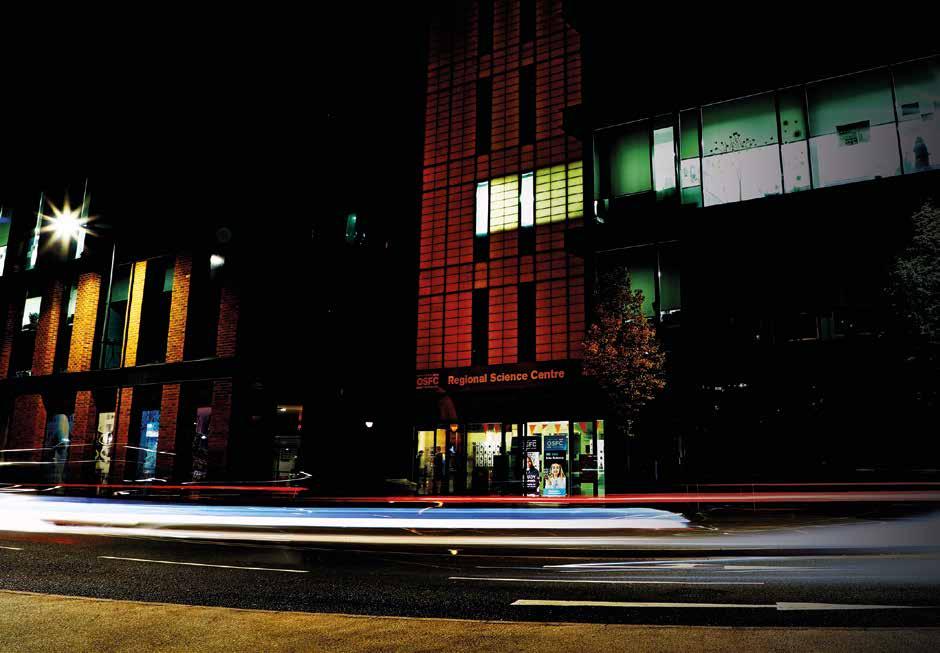WELCOME TO OLDHAM SIXTH FORM COLLEGE



We are delighted that you are considering joining our high achieving, inclusive and exceptional college.
We are proud to be a nationally recognised sixth form, transforming the lives of young people through academic excellence and outstanding support. It’s why students like you choose Oldham Sixth Form College.
We are confident that ‘by choosing us’ you will have an extraordinary education that will give you the platform to lead a purposeful and successful life.
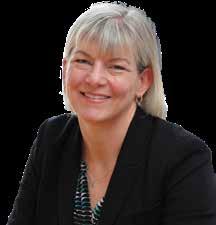
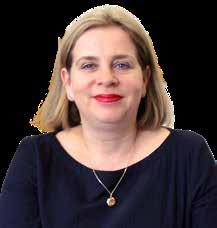
For each and every one of us, success matters, but we know it looks different for everyone. We are here to make sure you achieve whatever it is you want. From Oxford to Glasgow, via Manchester and Liverpool, our students can be found in the best universities in the UK and abroad, but there are so many other options too. Our specialist staff will help you to build your future. That may be university, or it may not. Oldham Sixth Form College alumni can be found in apprenticeships, travelling the world and even owners of their own businesses.
We know that it’s crucially important for you to study the courses that matter to you, led by expert and experienced teachers who understand how to help you maximise your potential. That’s why our Pathways give you access to over 50 courses, including the brand-new T Level qualifications, BTECs and over 35 A Levels, more than anyone else in the local area.
The Oldham Sixth Form College Experience goes far beyond the classroom. From our university-style independent study areas to the outstanding careers department and renowned Xtras Programme, you will have access to the best facilities and opportunities available. We also appreciate that sometimes we all need more support. That’s why our approachable and warm wellbeing team are always on hand to lend a friendly ear if you need someone to talk to.
Suzannah Reeves Associate Principal Jayne Clarke Executive PrincipalIf you work with us, you will find success. We very much hope you can see your future with us. Please read the prospectus and come and visit us to find out more.
1838
GRADES AWARDED AT A*-B AND EQUIVALENT
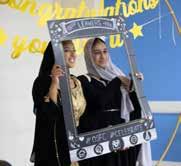
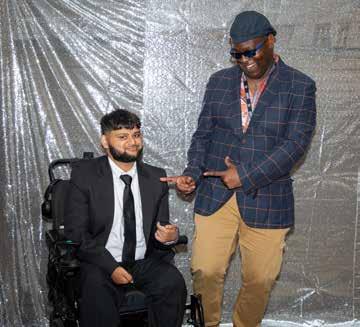
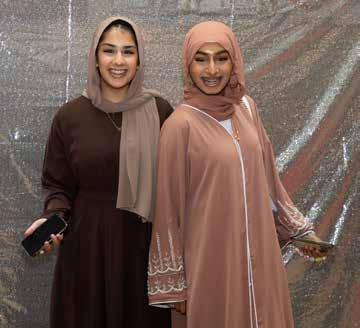
81% 93%
A*-B IN MODERN FOREIGN LANGUAGES
HIGH GRADES IN 3D DESIGN




100%
100%
46 COURSES HAVE ACHIEVED PASS RATE WITH OVER 1000 A* AND A EQUIVALENTS IN TRAVEL AND TOURISM MUSIC, APPLIED SCIENCE, SPORT, PERFORMING ARTS, CRIMINOLOGY AND FINANCE
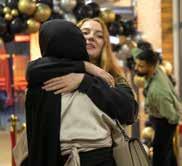
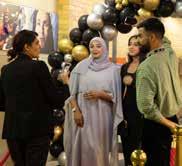
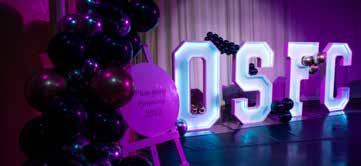
STUDENTS AWARDED D*D*D* ON VOCATIONAL PROGRAMMES
100% 69%
75%
HIGH GRADES IN PHOTOGRAPHY SUCCESS ON ALL VOCATIONAL PROGRAMMES
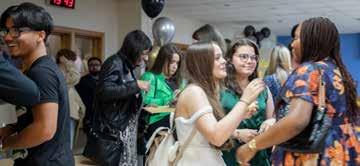
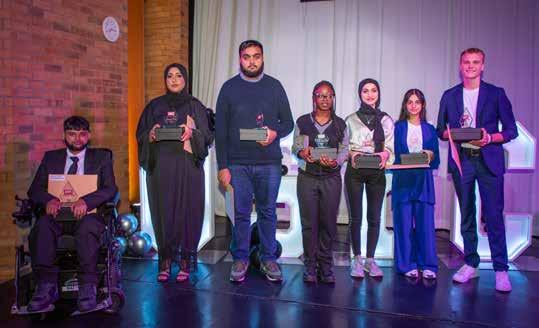
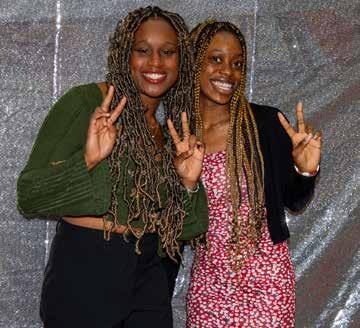
100% PASS RATE ON T LEVELS
100%
PASS RATE ON 3D DESIGN, TEXTILES, DANCE, ENGLISH COMBINED, ITALIAN AND SPANISH






100% 9
HIGH GRADES IN SPORT, ART AND TRAVEL EXTENDED DIPLOMA STUDENTS GOING ON TO STUDY MEDICINE
HIGH GRADES IN HISTORY
100%
46 IN EXTENDED DIPLOMAS IN TRAVEL AND TOURISM, APPLIED SCIENCE, BUSINESS, ART AND DESIGN, IT AND SPORT
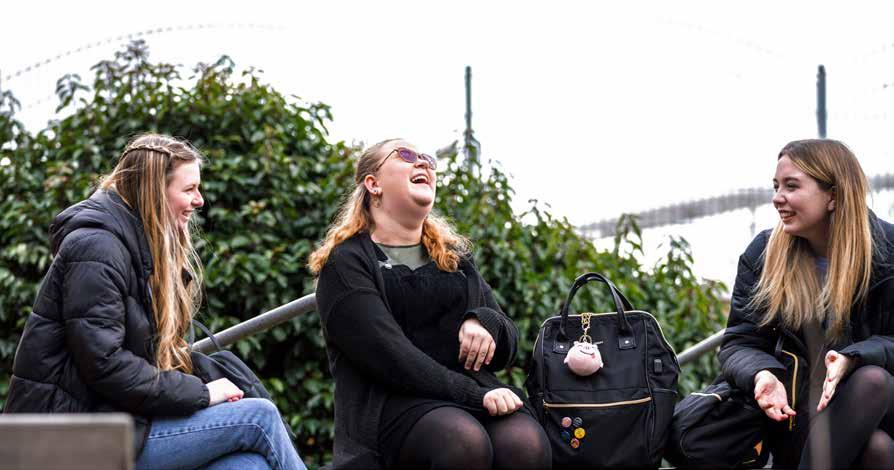
We have two qualified careers advisers, with over 30 years of experience between them. They are based in college and are on hand every day to give you advice about Higher Education, apprenticeships and career opportunities. You will create your individual progression planner during your time with us which helps you to identify your future route in education and employment, and understand the steps to reach your goals.
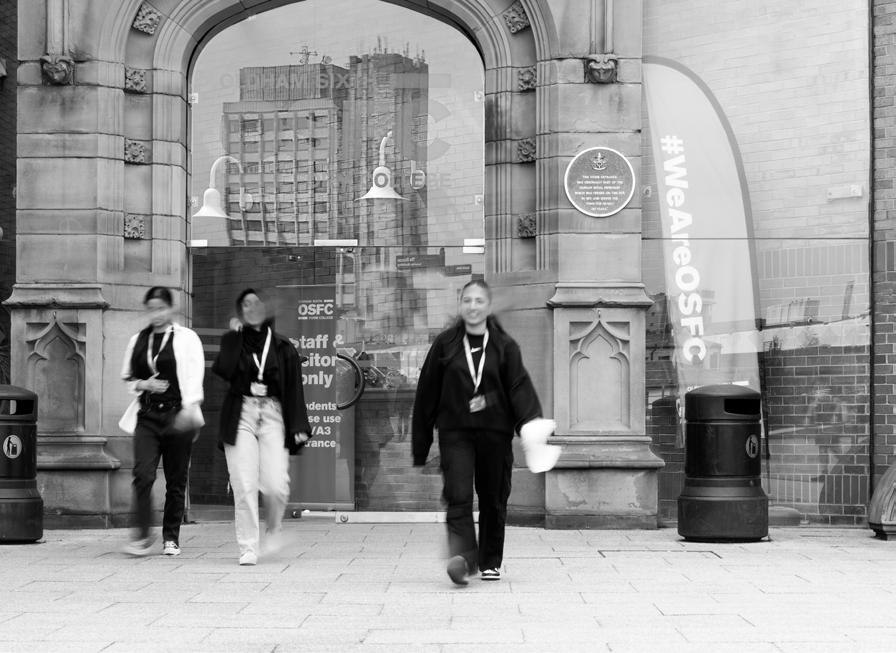
See more on pages 20-21
Our Xtras Programme is the envy of schools and colleges across the country. You will benefit from access to a HUGE range of activities. These will help you to find interests you didn’t know you had, supplement your classroom learning and be invaluable to boost university/apprenticeship/job applications. Importantly, Xtras is also there to make sure you have fun.
See more on pages 16-17
Getting into effective independent study habits is a key factor in being a successful student at The Sixth Form College. We have all the resources available to help you do just that. The Know is an exciting university style integrated learning environment located over two floors, housing books, PCs, a wide variety of open access study facilities and a comprehensive range of digital services.
See more on page 14-15
The foundation of your success at The Sixth Form College will be in the high quality of the classroom learning. By joining us, you will have the chance to join our incredible alumni who have gone onto achieve extraordinary things.
See more on pages 2-3
We fully recognise our statutory and moral responsibilities for safeguarding and providing you with the information and tools to be safe. But we know your wellbeing goes beyond that and we have a real focus on looking after all aspects of your emotional wellbeing and supporting you as you grow and develop.
See more on page 18-19
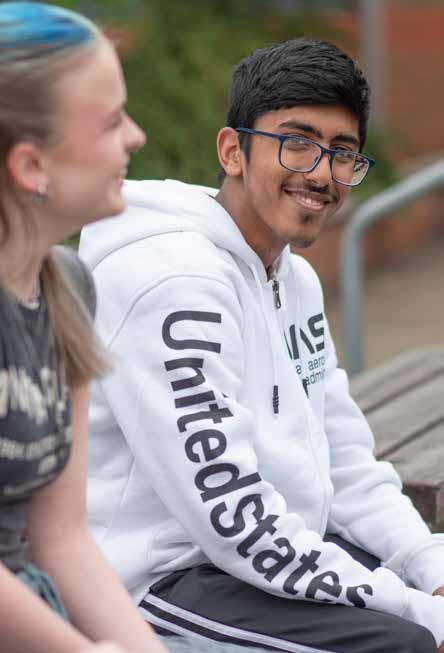
At the Sixth Form College you will experience a different sort of student life than the one you have been used to. We deliberately are not like school because we want you to be ready for whatever comes next, be that university or employment. But we also offer you support every step of the way.
You will meet lots of other people like you - everyone studying at the Sixth Form College is of a similar age, 16-19. There are no year 7s around the place, and there are no 19+ adults on courses, which means students share a lot in common. However, students come to us from many different schools with a wide variety of experiences and backgrounds, meaning there is lots to learn from each other too.
Two years goes by very quickly, and you will change significantly in this time. As you start in September you are a school leaver and, two years later, you say goodbye to us as a confident adult. In other words you will have taken some big steps whilst here.
For starters, you will decide what you wear - no uniforms! You will decide how you manage your study time - no school timetable! You will soon realise how much we encourage your independence because in treating you like an adult, we put you in charge of your choices.
“Students thoroughly enjoy their time at OSFC”
You will have received your offer of a place following your interview sometime between January and April
You get your GCSE results in August
Here is a brief outline:
You will attend an enrolment interview followed by a college induction
You will be given a laptop/ chromebook
You have end of term assessments in December
Collect for our Christmas Charity Appeal
Half term break 1 week
Get involved in our Pink Day Charity Fundraising event organised by the Student Union
Your Xtras programme begins
You will get a college timetable (which is not like a school timetable!) and classes begin in September
Christmas break 2 weeks You may have exams in January
Mock exams take place in February Get involved in British Science Week in March
Half term break 1 week
Come and watch the College Musicalor maybe you are in it!
Take part in residential trips and industry links
Half term 1 week
The Summer Exams begin in May
Look out for Wellbeing Week and the Sports Olympathon
Easter Break 2 weeks
Year 12 Parents Evening
Start to plan your year 13 at the Futures Fair in June
You will begin the university application process
You have reached the end of year 12its Celebration Day!
Summer break
Once your results are published in August you can enrol onto your year 13 courses
In September year 13 begins
Progress Tutors play a vital role in your life at the Sixth Form College.
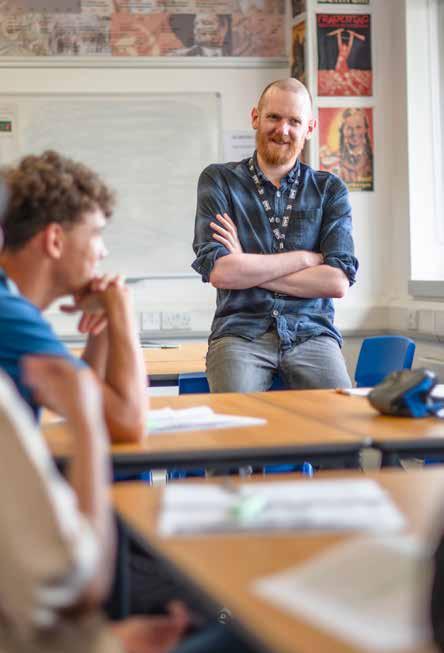
They will guide you through the transition from school to college and remain with you throughout your two years and are the first person you should contact if you need help or advice.
Progress Tutors help you set and work towards your goals. They develop you as motivated and independent learners, who will thrive in the college environment and in the wider world. Your Progress Tutor is your critical friend, who helps you to reflect and take responsibility for your progress. Trained in Youth Mental Health First Aid, they are also experts in dealing with stress and nurturing a positive mental outlook.
You will see your Progress Tutor every week in a tutorial class and you will also have 1:1 support. The weekly tutorials look at how students can make the most of their college experience and support you in making the big choices about your future. There is also a focus on careers-related activities, including looking at university, apprenticeship and job options after college.
“I work creatively with an openminded attitude and am always up for a challenge! I hope to help ease the transition for students from secondary school to college and support students in their progression beyond The Sixth Form College.”
Jess Goodson“I worked as a secondary school science teacher for several years, after studying Chemistry at The University of Manchester, and then completing my PGCE. Having worked as a teacher and now as a Progress Tutor, I have seen the impact that excellent pastoral support can have on a students’ academic progress. My main aim is to help my students realise that nothing is unachievable.”

 Sahreen Ashfaq
Sahreen Ashfaq


“I came to The Sixth Form College to work as a Progress Tutor in 2017, having previously gone back to university to do a Master’s degree in Musicology. I came to music quite late, only taking up my first instrument when I started my A Levels, so I particularly enjoy working with students to figure out what they want to do in the future and reminding them that life’s path is rarely straightforward!”
 Edd Pullin
Edd Pullin
“I love being a progress tutor, as I can be part of the great team at The Sixth Form College leading our students towards their goals and helping them to make the right future plans and choices.”
Emma Hart
“I am a qualified Climbing, Zip Wire, Segway and Archery Instructor. I have helped people face their fears, nurtured their hobbies and aided them with life experience beyond education.”
Tiree Kirk“I am responsible for our work with students in schools, before they join Oldham Sixth Form College, and their progression to university, when they leave us, and I am passionate about helping students reach their aspirations. I run our programmes for our high achieving students, such as the Varsity Programme, the Oxbridge Group and our programmes for AspiringMedics (AMP) and Aspiring Lawyers (ALP).”
Richard Lee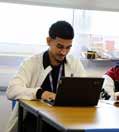



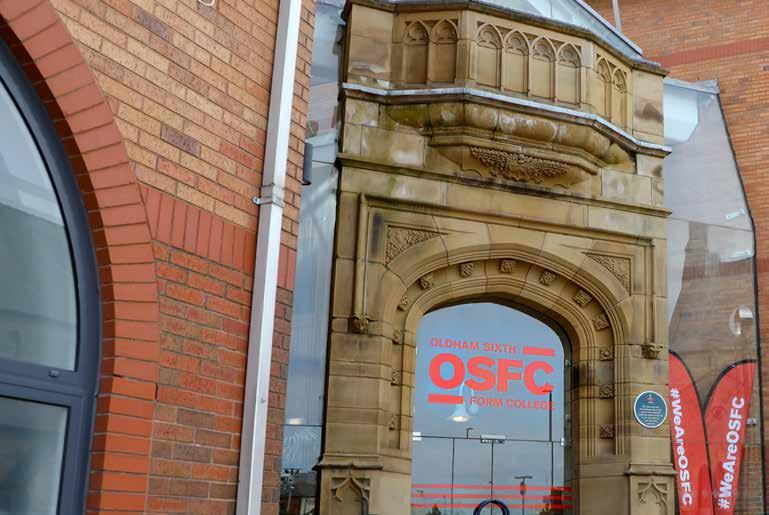
6:45
Wake up and get ready for college
7:30
Catch the bus to Oldham (using my Our Pass card)
9:00
My first lessonEnglish Literature. I take notes throughout my lesson to look back over later
10:10
Movement time in between lessons, I walk over to Duncan Lawton Building for my next lesson
10:20
8:30
Arrive at college and meet friends in The Restaurant before my first lesson
My second lesson - Psychology
11:30
I catch up with friends in The Cafe during break
19:00
I will do any homework I have been set or read over my notes from today’s lessons
17:00
Relax or exercise for an hour before eating my dinner with my family
11:45
I have a self study lesson so I spend my time in The Know completing homework for my Biology lesson tomorrow.
16:15
21:00 Prepare myself and my books/ equipment etc for college the next day
I leave college and go into Oldham to get the bus home
22:00
Relax, read a book, then sleep
15:05
I have my final lesson for the day - Chemistry in the Science Centre. We have a busy lesson taking part in a practical experiment.

13:45
I have Tutorial, this is where we find out all important information about life at college, applying for university, set targets for the year and much more

12:45
I eat lunch with my friends in The Restaurant.
Ofsted 2022
The Sixth Form College was the perfect bridge between school and university. I liked the freedom of studying subjects I enjoyed and managing my own time to ensure I was in control of the work that needed doing. The staff were always really supportive and eager to help which made studying enjoyable!
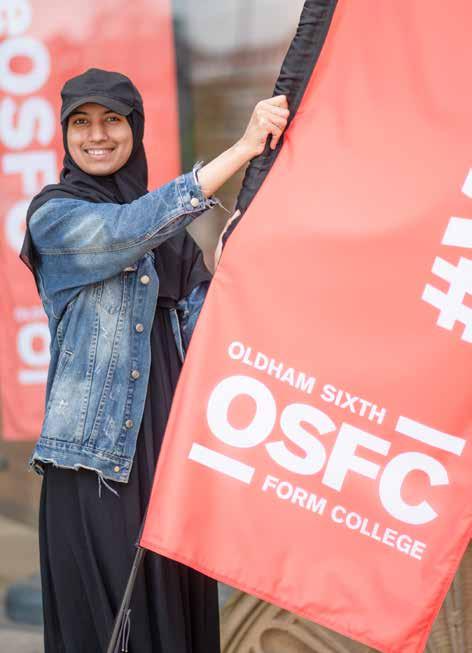
Although my two years at The Sixth Form College seemed to go by quickly, I cannot underestimate how important the skills and knowledge I learnt were and how much they helped me to transition to university life!
Mark Barrow, Studying for a Phd in Politics and International Studies, OSFC student 2013-2015
“Outstanding Leadership and management”
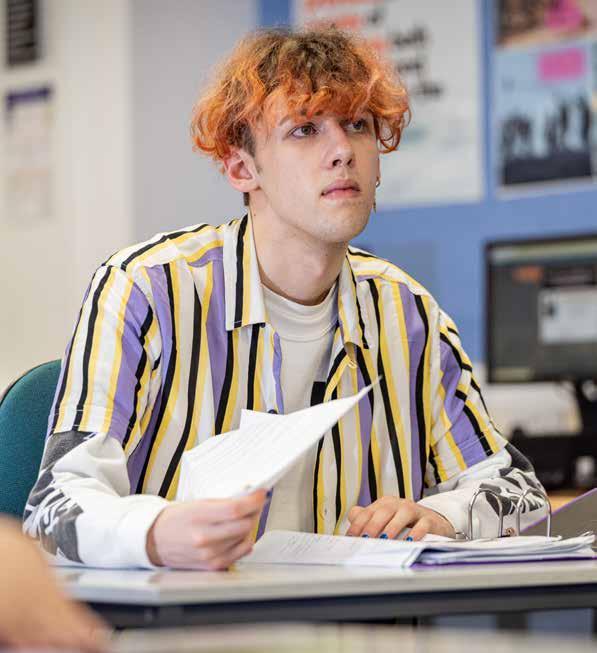
Coming from a state school background as the first in my family to attend university, being at the University of Cambridge often leaves me with a sense of being out-of-place. My privately educated peers, oftentimes the children of Oxbridge alumni, had been preparing themselves for this future for far longer than I had, with the access to resources I had never even dreamed of. Yet through the unwavering support and dedication to my education shown by my teachers and mentors, I was able to break through to where I am today, and the vast majority of that care and guidance came from the staff at Oldham Sixth Form College.
Last week, I had the pleasure of returning to that college to talk about my experience applying to and attending Cambridge University. Despite the profound sense of déjà vu I felt remembering what it was like to attend one of these talks during year 12, the experience reminded me of how much I owe to that sixth form. Despite the odds being stacked against me and my peers there, the fervent endorsement in our futures which the staff provided, shown through arranged visits from Oxbridge alumni and admissions staff, preparation and advice sessions on what to expect from the applications process, and consistent personalised support during it allowed me to earn a place at the university of my dreams.
It is my hope that the session inspired the current students of OSFC to see Oxbridge as a place they can attend. Beyond the material and institutional barriers that keep us away, that out-of-place feeling amongst people from my background is a huge factor in admissions inequality. I hope that my visit was useful to the pupils and sparked within them the confidence that I gained during my time at the college. Being so passionate about ending educational inequality, I see any chance to tackle this issue as deeply important, but the personal connection with this visit reminded me how much I owe to the incredible teaching staff I have been supported by. Especially, Richard Lee, my Oxbridge mentor at OSFC, without whom I would have never even considered Cambridge to be a place for me.
I look forward to taking up further opportunities to share my experience as a working class Oxbridge student and to tackle the complex web of barriers that have made people like me feel out-of-place in a place I love so much.









































We are committed to sustainable actions and our reduction in carbon dioxide.
Our Sustainability Action Group, made up of staff and students, works with the whole college community to reduce our environmental impact, contributing also to the Pinnacle Learning Trust’s sustainable goals and doing our bit to save the planet. We meet regularly to launch initiatives like Sustainability Week and the ‘SOS Teach-In’, ethical recycling and upcycling campaigns, and we publish a termly sustainability newsletter.
We’re proud of our commitment to the environment. Our prospectus is printed sustainably using cutting-edge digital technology, which minimises waste and energy consumption. We exclusively use eco-friendly, recycled paper from sustainable forests. Every page in your hands represents a step towards preserving our planet.
Ofsted 2022
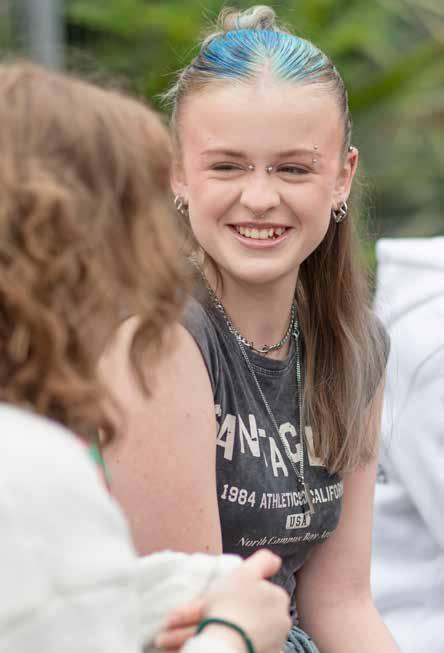
STATEMENT
“Outstanding Behaviour and Attitudes”
We endeavour to empower all those within our college community to grow and have fun, feel safe and be successful. Staff and students have the freedom to be themselves and make the most of the opportunities available. Our EDI group is committed to maintaining an inclusive culture where everyone is valued and respected. We have a long established LGBT + group called Love is Love.
The Student Union is the voice of students and is involved in many aspects of college life. Members sit on the College Governing Body, are involved in Equality and Diversity, Marketing, Sustainability, Catering, Marketing, Events and Fundraising. You can be actively involved in these groups through the Student Union, or express your views and ideas by contacting the members of the Student Union.
The Student 100 is our sounding board (we also have Parent 100 too) that, along with the Student Union, contributes to conversations about what should happen in the college and what decisions the college should make.
As an OSFC student, you can apply for a bursary to help with college related expenses. The bursary is assessed on household income/benefits received by either yourself or your parent/carer. If you are eligible, you would receive a half termly cash payment, £5 per day to spend in the onsite cafés and restaurants, plus possible assistance/discounts on other expenses.
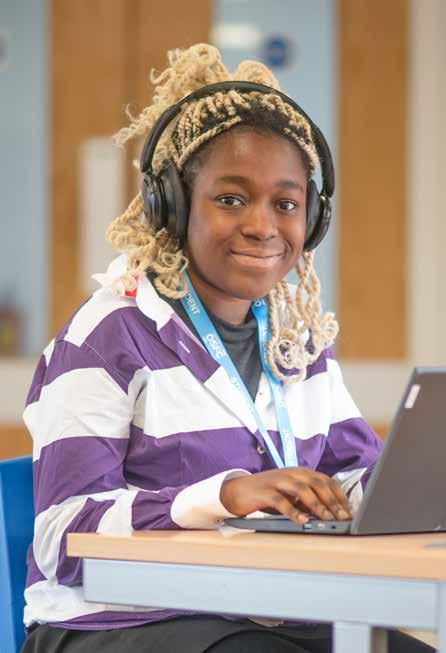
“Diversity is celebrated and everyone is welcome”
Ofsted 2022
The Know is an exciting university-style integrated learning environment located over two floors, housing books, PCs, a wide variety of study facilities and a comprehensive range of online services. The Know also offers an up to date book stock covering all aspects of the courses you will be studying, popular magazines, and reference materials which will enable you to research any topic.
Wi-Fi access, laptops, e-books and e-readers are also available. Soon after you arrive, you will have an induction into The Know which will explain procedures and show you how best to benefit from your time here. You can also become a member of Oldham Libraries here.
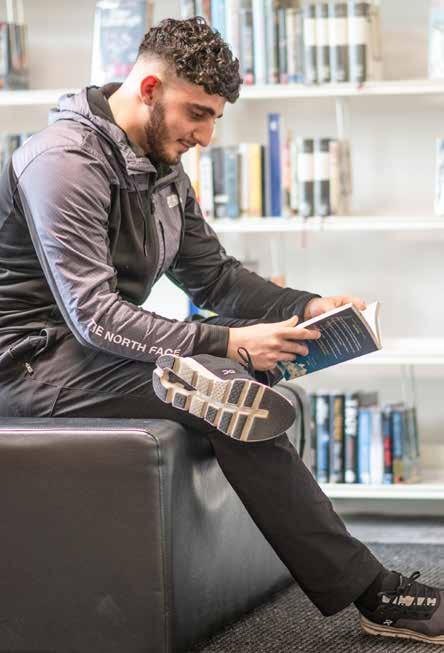
“OSFC is a calm, focused environment in which students have a positive, mature attitude to learning.”
Ofsted 2022
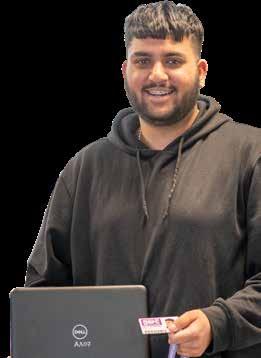
Being a successful sixth form college student requires you to be an independent learner and we encourage you to allocate an additional four hours of independent study per week for each subject. Through your bespoke Tutorial Programme we help you to study effectively and consistently.
A key tool we use to help you reflect on your current study habits is the ‘Effective Studying Checklist’. For studying to be effective it should include Content, Skills and Feedback activities.
* Content activities help consolidate your understanding of topics
* Skills activities help you check your understanding
* Feedback activities help you check what you know and what you need to look at again
The checklist helps students identify if they do all 3 types of activities and provides some simple, easy to use ideas for each activity.
Your timetable will include study periods, when we encourage you to make use of the many quiet and group study areas we have around college.
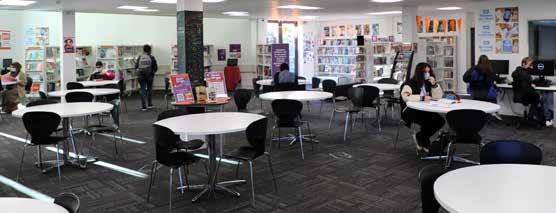
We work hard to develop your time management skills, as well as your independent study skills, revision and recall techniques, so you become the best learner you can be.
If you have additional learning needs, our expert Learning Support team will ensure you can access the facilities and equipment you need to thrive. They will arrange:
* Literacy and numeracy workshops
* Individual or group support for dyslexia and other specific learning needs
* Learning Mentors
* In-class support
* Exam access arrangements
You will find study areas across all the college buildings where you can work independently on your assignments. We also have an extensive on-line resource bank including popular academic journals, National Theatre collections, The Science Reference Centre and Massolit.
You will have study periods on your timetable where instead if lessons you can use these facilities and develop your independent learning skills.
We give you a laptop or a chromebook for the duration of your time at college. It is very important that every student has the same access to technology, so look after it, because someone else will be using it once you have left us. It is your textbook, your notebook, your research tool and your organiser. We are a Google College which means we have pioneered the use of Google Workspace in our teaching. You will be introduced to the Google Apps needed for study, and you will soon become familiar with Google Classroom and Google Sites as important learning platforms.(see also the supporting you every day section on the Futures page)
Our Sports, Fitness and Health activities include the ambassadors programme, coaching local primary school students, organising sports tournaments and volunteering at local sports clubs. Also within the college week there are large numbers of students attending Badminton on Mondays, Volleyball on Tuesdays, Basketball on Thursdays and Cricket on Fridays, all taking place after 4pm they are a great way to end the academic day. The introduction of both Pickleball and Climbing Club after college on Thursday is also popular with many students trying their hand at both for the first time.
Our Xtras programme is open to all students, and is a great way to develop new interests, have fun, and meet new people. You have the opportunity to develop many different skills.
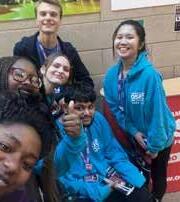
Our Varsity activities extend academic skills and preparation for high level study. Our Oxbridge group and ‘Aspiring’ programme supports those students intending to apply for very competitive degree programmes. Equally the Critical Thinking activities develop analytical processes, research practices and debating skills. Whether that’s on an EPQ course, learning about finances, or honing your critical awareness through Amnesty International.
Our Culture activities are exciting, wide ranging, and stimulating. Whether it’s a big event like the college production, or something quieter like a reading group, or film clubsomething will catch your imagination.
The college’s STEM activities capture the scientific interest of many students. Aspiring biologists might be interested in the dissections of the Anatomy Club, Sustainability activities and Teen Tech Awards pose challenging problems to solve. Perhaps working as a primary school science ambassador will build your confidence?
We also offer Leadership opportunities through The Student Ambassadors scheme, the Airwalk Leadership Academy, and the Student Union. As well as the opportunity to run events as part of the college sports or arts calendar.
At The Sixth Form College we have many close connections with organisations and businesses that give you the diverse opportunities that we feel will broaden your horizons towards a vibrant future.
One of our newest and exciting associations is with Phoenix Dance Company, who are developing a Youth Academy in Oldham. Many Youth Academy graduates have gone on to successfully audition for: Rambert School of Ballet and Contemporary Dance, Northern School of Contemporary Dance, London Contemporary Dance School, Trinity Laban Conservatoire of Music and Dance, The Ailey School, Institute of the Arts Barcelona, Royal Conservatoire Antwerp, Bird College, Laine Theatre Arts and Urdang Academy. Two Phoenix Youth Academy graduates have succeeded in being category finalists in the BBC Young Dancer competition.
Our Rugby Academy programme has been developed to allow 16-19 year old learners to combine their academic studies at the college, while also taking part in the Rhinos’ world class rugby league performance programme and pathway. Students enrolling into the college will be able to undertake the college’s full range of A Level or Vocational programmes whilst playing rugby alongside. In practice this might mean that students select 4 subjects of their choice, or undertake an extended vocational programme (3 A Level equivalent e.g Sport Extended CTEC).
Students with IT and computing ambitions can join Airwalk Reply’s Leadership Academy. The company is a leading cloud specialist and consultancy group, developing IT architecture, design and engineering. This is an exciting, new and exclusive partnership that develops your skills through a recognised qualification in leadership. The Academy will run throughout Year 12 and will also involve 4 days during the Easter Holidays. With their support, you will put core leadership and project management skills into practice by developing and delivering a community project of your choice. Participating students will complete the Institute of Leadership & Management Young Leaders Award.
The Royal Exchange Theatre operates a scheme with the Sixth Form College whereby students enrolled on theatre and performance based courses have exclusive access to the Young Associates programme, The Royal Exchange has been at the forefront of British theatre for nearly 50 years and is a major creative hub in the area. The Young Associates programme provides access to workshops, theatre tickets and special events throughout the year.
The Duke of Edinburgh Award is highly recognised throughout the country; according to a national survey by the United Learning Trust, it’s the most important additional activity you can undertake in terms of employability and future prospects. Therefore, it can be instrumental in landing the university place or job you really want.
Almost all of our Xtras courses contribute towards the Award, so it can be really easy to complete D of E sections whilst you’re here. Equally, you may already be doing things that you can use towards your award such as, playing netball, learning first aid, improving your photography skills, playing a musical instrument, being in our college production or learning to drive.
“Students flourish as individuals and become more active citizens in their communities” Ofsted 2022
At The Sixth Form College, we are fully aware of the emotional health and wellbeing challenges that our students can face in their lives. This is why we ensure everyone who attends our college has the best possible support to fulfil their potential and has access to the resources they need to thrive.
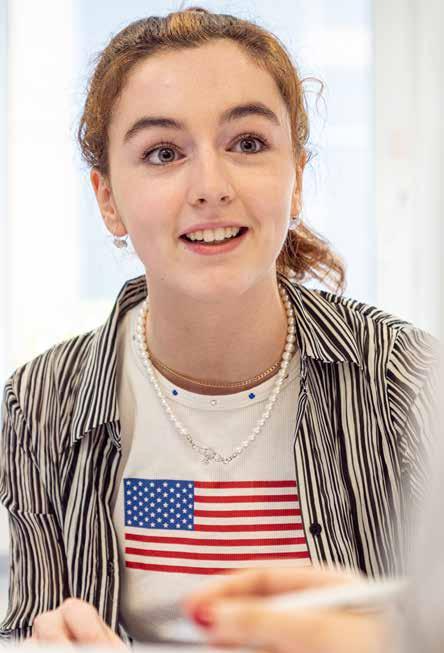
We do this by:
* Ensuring we provide students with the information they need to keep themselves safe and well through tutorial and college-wide initiatives.
* Having high quality conversations with all students, when transitioning from school to college.
* Providing all students with a dedicated Progress Tutor, who can help with a range of issues - from study support, to mental health support.
* Giving students access to a specialist Welfare and Support team, who are able to help with more complex issues.
* Making counselling and psychological support available to students who may need it.
* Involving external agencies when specialist support is needed.
* Promoting the Five Ways to Wellbeing.
* Many of our staff are trained in Mental Health First Aid and Connect Five to help foster productive conversations surrounding mental health.
* Along with the brilliant additional support team, our Progress Tutors can confidently hold initial conversations and direct students to expert organisations, such as CAMHs, Oldham Talking Therapies and TOG Mind, so they can seek additional information and help.
We liaise with school to ensure any support that learners had at school and arrangements at GCSE level are in place for exams at College. Assessments are completed in College, as necessary by our specialist team.
We also encourage you to attend a transition appointment to meet the team and provide us with information about the past provision you have had in your exams, in lessons and any specialist equipment you may need.
The Additional Support Team would be the key contacts you make before coming to the College and will be the people most involved in organising your support requirements. The SENDCO for the College is Karen Bates. Other members of the Additional Support Team include SkillsPlus+ tutors and Learning Support Assistants, who provide in class support, mentoring and run the supported lunch groups.
We welcome students with additional support needs and will try to make the transition from school to college as smooth as possible. Our friendly, expert Additional Support team Team work closely with students to ensure their learning needs are met.
The College’s highly effective support for students with additional support needs is a key strength and students make excellent progress while they are with us. Support for students can take a variety of forms, including literacy workshops, individual or group support for dyslexia and other specific learning differences, skills plus+ sessions, mentoring, in class learning support assistants, and special arrangements for exams.
We are able to provide a range of specialist facilities and equipment including laptops, dictaphones and specialist software, through to adjustable height desks and a Braille facility.
We also have close links with the Oldham SEN Advisory and Teaching Service, who provide valuable support and specialist advice. If you do have any special learning requirements, please fill out the relevant sections of the application form or contact the College before you start. We also liaise directly with your school, so all of your needs can be met. Copies of College publications are available in alternative formats, such as audio, large print and braille on request.
“Student receive high quality support” Ofsted 2022
Maybe you are aspiring to Oxbridge or a Russell Group university, perhaps the course you want to study at university requires particular experience or qualifications, you could have your eye on apprenticeships and vocational pathways into employment. We support your progression every step of the way.
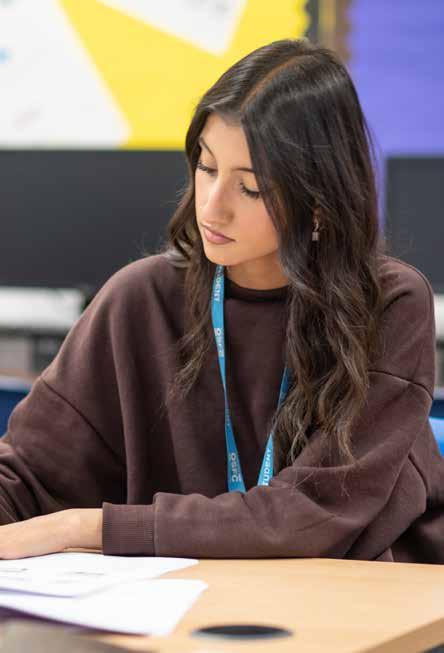
The Varsity Programme is the college’s overarching support programme for all students wanting to progress to university. This includes regular sessions with Progress Tutors on study and work options after sixth form college, the advice and guidance of 2 full-time Futures Advisers, and an annual Futures Fair, alongside specialist support programmes, such as the Aspiring Medics’ Programme (AMP) and the Aspiring Lawyers’ Programme (ALP), as well as many other opportunities.
Every student has unlimited access to one-to-oneguidance provided by our highly qualified staff. A range of careers and employability events take place throughout the year such as:
* University open Day visits
* Year 12 Futures Day
* Online Mentors from work and university
* Mock Interviews
* Higher Education parents evening
* Support for apprenticeships and employment seeking.
The Oxbridge Group supports students who are considering making applications to either Oxford or Cambridge University. The group starts meeting in Year 12, after October half-term, for sessions that aim to demystify Oxbridge.
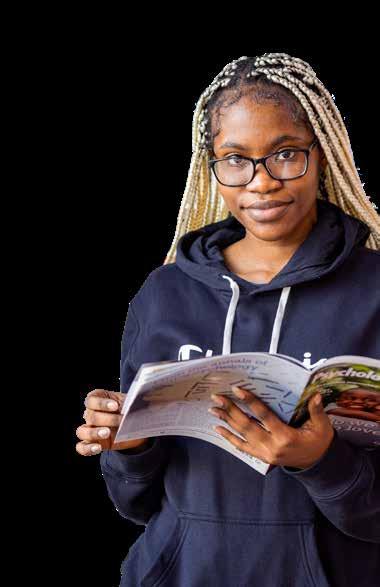
After February half-term, the cohort subdivides into 3 more specialized groups: Oxbridge Humanities, Oxbridge Science and Oxbridge Medicine. These smaller groups then meet on a weekly basis to offer help with super-curricular research, application forms, entrance exams and interviews - taking students through the whole application process and coming to an end at Christmas in Year 13.
There is also an annual trip to Oxford in June each year, where students spend a night in an Oxford college, living like an Oxford student, before visiting an Oxford Open Day.
Our Futures team publicize all available additional opportunities to students, including university outreach projects and summer schools.
The college enjoys particularly strong links with the OxNet Programme, which is run by Pembroke College, Oxford University. This programme allows successful applicants to engage in an online seminar series with students from all over the country, to enter a competition, and to spend a week in August at Pembroke College. It is a fantastic experience! One of the Sixth Form College’s Assistant Principals delivers the OxNet English programme on behalf of Pembroke College.
“Students receive highly effective careers advice”
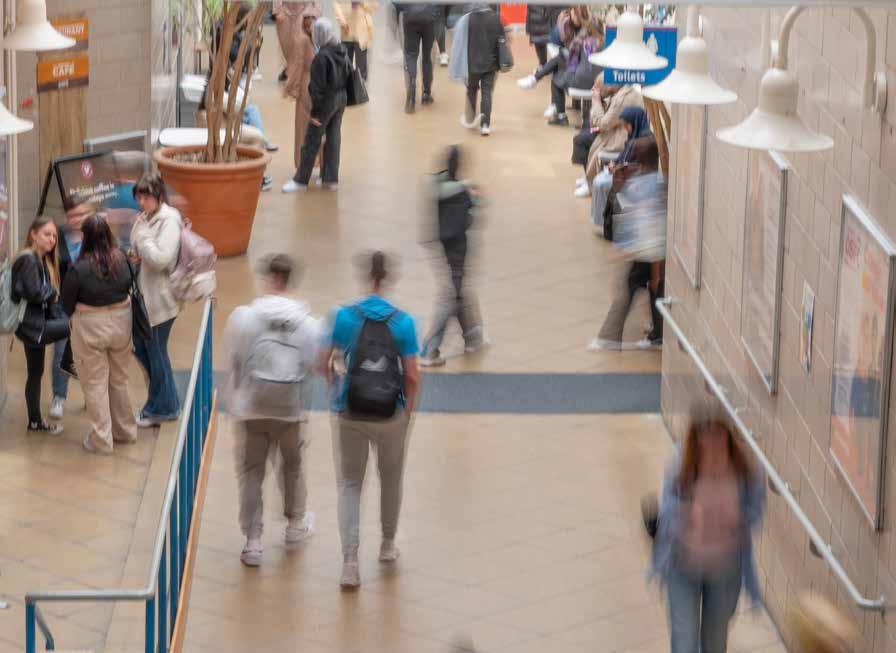
One benefit of studying at The Sixth Form College is that you really do get to fit your education around your interests and your future, and this starts in the classroom. With one of the broadest curriculums on offer in the whole of the North West, you can choose to study on one of 4 exciting Pathways: A Level, Vocational, Blended and a transformational qualification called a which is changing the way we look at education.
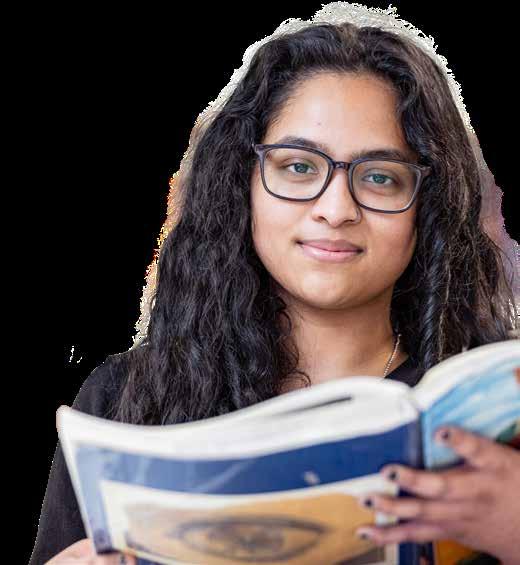
With over 35 A Levels to choose from, our A level programme offers you as much variety and specialism as you could want. All students take four subjects in Year 12, which allows for breadth of choice and is extremely well received by universities and employers.
Our Vocational Pathway leads to a range of exciting opportunities. You will specialise in one broad subject area and look at all aspects of it. Our vocational courses are perfect for students who want to study a subject that links directly to an area of work. As 80% of these courses are assessed by coursework, students who work hard throughout the year will achieve excellent grades and progress onto many diverse degree courses and higher apprenticeships in these career areas.
A Blended Pathway allows you to combine a range of subjects and examined and coursework units. It allows you to follow a vocational programme, but also gives the flexibility and breadth of study of an A Level Pathway. It is ideal for students who prefer coursework, as the majority of units can be assessed this way. You may also like the idea of studying up to 4 different subjects. You could choose two single diplomas and an A level or a double diploma and an A level. There is also the opportunity to take on work experience.
T Levels are brand new courses, focusing on blending college-based learning with industry placements. You combine classroom lessons with a 45-day placement, giving you core knowledge and on-the-job experience and skills. If you opt for a T Level, you would choose 1 subject, with a specialism in Year 2. The experience and skills you develop are invaluable in ensuring your progress in your chosen career.
There are over 50 courses to choose from at The Sixth Form College and making your choice is not always straightforward. Use the information on the following pages to explore and discover more about each one.
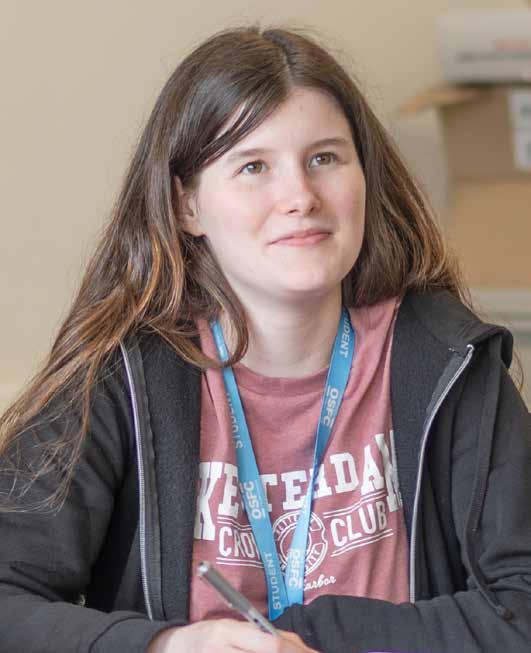
Entry requirements
A Level and T Level Pathways
A minimum of 5 passes (above a 4) at GCSE, including at least a 4 in Mathematics AND English
Vocational and Blended Pathways:
A minimum of 5 passes (above a 4) at GCSE, including at least a 4 in Mathematics OR English
Special Programme
A full time programme which will immerse you in the world of electronic sports!
STEP 1
CORE SUBJECT
A Level Computer Science or BTEC Single Award IT
STEP 2
DEVELOPING TECHNICAL SKILLS
Choose from A Level Media, A Level Film, A Level Graphic Design, or BTEC Music
STEP 3
DEVELOPING PROJECT MANAGEMENT SKILLS
Choose from BTEC Business, BTEC Travel & Tourism or BTEC Sport
STEP 4
DEVELOPING ACADEMIC BREADTH
Choose from another of the subjects already listed in ‘Developing Technical Skills’ and ‘Developing Project Management’ or another recommended course.
ENRICHMENT OPPORTUNITIES
British Esports Student Championships - team entries playing either League of Legends, Overwatch, Rocket League or Valorant.

PROGRESSION LINKS
University of Salford - Esports Business Management
Special Programme
A full time programme which will immerse you in the world of interactive digital media!
STEP 1
CORE SUBJECT
BTEC Single Award IT (to develop computer literacy)
STEP 2
DEVELOPING VISUAL COMPOSITION & DIGITAL SKILLS
Choose from A Level Graphic Design or A Level Photography
STEP 3
DEVELOPING EDITING, VISUAL NARRATIVE OR WRITTEN SKILLS
Choose from A Level Media, A Level Film or A Level English Language

STEP 4
DEVELOPING ACADEMIC BREADTH
Choose from another of the subjects already listed in ‘Developing Visual Composition & Digital Skills’ and ‘Developing Editing, Visual Narrative Or Written Skills’ or another recommended course.
ENRICHMENT OPPORTUNITIES
Podcast Production, Film Club, Journalism, Art Social Media, e-Magazine.
PROGRESSION LINKS
SODA (School of Digital Arts) at Manchester Metropolitan University
Futureworks: digital pathways Arts Emergency Mentoring Scheme
Special Programme
A full time programme which will immerse you in the world of the creative arts!
STEP 1
CORE SUBJECT
CAMTEC Performing Arts (combining drama, dance & music)
STEP 2
DEVELOPING PERFORMANCE SKILLS
Choose from A Level Dance, A Level Drama or BTEC Music Performance
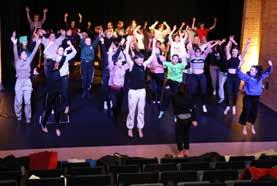
STEP 3
DEVELOPING RECORDING SKILLS
Choose from A Level Film, A Level Media or A Level Photography
STEP 4
DEVELOPING ACADEMIC BREADTH
Choose from another of the subjects already listed in Developing Performance Skills’ and ‘Developing Recording Skills’ or another recommended course.
ENRICHMENT OPPORTUNITIES
Musical Theatre Production, Several Performance Opportunities, Online Content Creation, National Theatre Script Writing Scheme, Residential Trip to London, Film Club.
PROGRESSION LINKS
Phoenix Dance Youth Academy
National Theatre Young Associates Programme Arts Emergency Mentoring Scheme
Pathway: A Level Exam board: OCR
Assessment Year 1: 100% coursework (through an externally set project)
Assessment Year 2: 100% coursework (40% of this through an externally set project)
Special entry requirements: A minimum grade 4 in an Art related GCSE is required (this can include a 3D based Design Technology GCSE).
If you’re a hands-on person, enjoy being creative and like the idea of exploring ideas through 2D drawings and with techniques using 3D media, materials and processes, then you will enjoy the 3D Design course.
No prior 3D designing or making experience is needed, as all of the skills and techniques you will use are introduced on the course. This is a fantastic A Level if you want to pursue a future in one of the many Art and Design career routes, develop your art and design skills generally or if you want to add variety to their study programme by taking a more practical, hands-on subject.
WHERE WILL THIS LEAD?
3D Design will help you develop creative skills, problem solving, as well as technical ability and attention to detail. Former students have continued their studies or launched careers in a wide range of art and design fields. Specific 3D routes include product design, architecture, industrial design, interior design, crafts, jewellery design, furniture design and sculpture.
You will have the opportunity to enhance your learning through trips, including a department trip to art galleries in London, alongside galleries closer to home. Relevant off-site activities also take place to help facilitate collecting research for projects.
We are frequently contacted by universities, employers and organisations offering a wide range of relevant opportunities and competitions, which will further add to your understanding and experience of what art and design can offer.
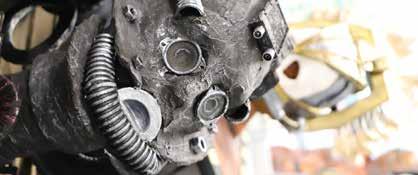
Pathway: A Level Exam board: OCR
Assessment Year 1 and Year 2: 100% Exam
Delve into a world of murder, intrigue, mystery and the quest for power by reading accounts from the people who experienced these dangerous times and by examining the archaeological relics they left behind.
Ancient History is the study of Greek and Roman history through the use of ancient sources Embarking on this course will give you extremely important skills for both university and your future career: learn to analyse, interpret, evaluate source material and to debate key issues from ancient history.
An Ancient History qualification will support your application for a wide range of HE courses, including History, Law, Politics, Archaeology and Classics.

Our students have gone on to both study and work in a diverse range of areas including teaching, research, medicine, law, business, museum curation and archaeology.
Related trips to museums, archaeological sites and exhibitions will be organised, as well as the chance to read widely and listen to talks and lectures from experts in this field.
Pathway: Blended Exam board: Edexcel
Assessment Year 1 and Year 2:
46% Exam; 54% coursework
You will follow a practical and balanced science programme covering Biology, Chemistry and Physics. You will visit real scientific workplaces and have the opportunity to go on a work placement.
As assessment will be a combination of examined and internally assessed (coursework) units, you will learn to work independently and in groups.

Your subject tutors will motivate you to analyse and improve your own performance. You will study a whole range of units, including Human Physiology, Medical science techniques and Chemistry practical.
Former Applied Science students have progressed to HE courses such as Chemistry with Forensics, Forensic Science, Pharmaceutical Management, Teaching, Nursing, Chemistry, Biology, Radiography, Optometry and Biomedical Sciences.
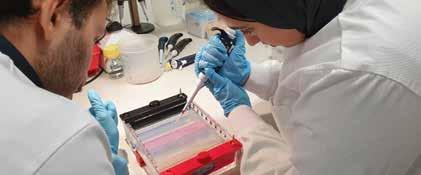
There are also a wide variety of careers available for you to explore such as medical physicist, medical laboratory assistant or chemist.
Our superb laboratory facilities mean that you will have the opportunity to gain a wide range of practical and analytical skills in the fields of Chemistry, Physics and Biology. You will have the opportunity to help out in the OSFC Regional Science Centre and get involved with primary science, Nuffield placements and STEM activities during British Science Week.
All students studying a science course are able to become a Science Ambassador. This allows students to take part in events both at college and external trips to local universities and to promote science to younger students from local secondary and primary schools.
Assessment Year 1 and Year 2: 42% Exam; 58% coursework
You will follow a practical and balanced science programme covering Biology, Chemistry and Physics. You will visit real scientific workplaces and have the opportunity to go on a work placement. As assessment will be a combination of examined and internally assessed (coursework) units, you will learn to work independently and in groups. Your subject tutors will motivate you to analyse and improve your own performance. You will study a whole range of units, including Human Physiology, Medical science techniques and Chemistry practical.
Former Applied Science students have progressed to HE courses such as Chemistry with Forensics, Forensic Science, Pharmaceutical Management, Teaching, Nursing, Chemistry, Biology, Radiography, Optometry and Biomedical Sciences. There are also a wide variety of careers available for you to explore such as medical physicist, medical laboratory assistant or chemist.
The BTEC Extended Diploma is a full time, standalone, two-year course of study which will develop specialist knowledge, practical skills and understanding within a vocational area and will give you a qualification that is the equivalent to three A Levels. In most subjects, students will be awarded the BTEC Extended Diploma at the end of their two years of study.
The Extended Diploma is fully recognised by universities and carries UCAS points, enabling you to progress to university or directly into employment. If you want to commit to vocational study in a particular area, then this could be the route for you.
Special Features for the Applied Science Extended Diploma are the same as the Single Diploma, please see previous page for this information.
A*A*A*B in Further Maths, Maths, Physics & Politics.
Josh is now heading off to study Maths at Oxford University.
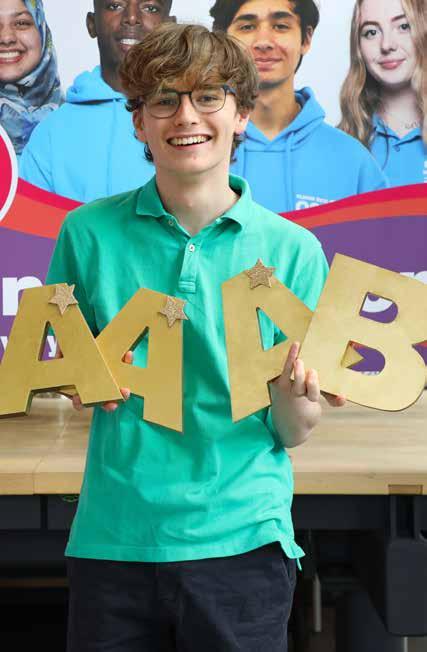
Pathway: Vocational Exam board: OCR
Assessment Year 1 and Year 2: 100% coursework
Special entry requirements: A minimum grade 4 in an Art subject at GCSE is required. Exceptions may be made for able students who can supply a portfolio of work at enrolment.
This course is ideal if you wish to study Art & Design full-time. It is equivalent to three A Levels and provides a vocational alternative that helps to prepare learners for the world of work or to continue their studies in Higher Education. You will have the opportunity to gain practical and creative skills by working with a wide range of 2D and 3D materials, processes and techniques across a range of disciplines, including photography, graphic design, 3D, fine art and textiles. It provides an understanding of art, design and craft through engagement with the work of artists and designers. The course is internally assessed and exam-free, so suited to all learning styles.
Art & Design helps you develop a range of creative skills, which are valued highly by universities and employers. Our former students have gone onto careers and HE courses in all areas of art and design, including graphic design, illustration, interior design, photography and advertising. Many students also progress onto Pre-Degree Art Foundation courses.
• As part of this course, you will have a valuable opportunity to gain work experience in the creative industries.
• You will have the opportunity to enhance your learning through trips including visits to galleries and exhibitions in London and more locally.
• You can also take part in student competitions and opportunities in Art & Design.
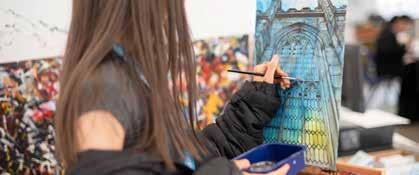
–––
Josh Bruton
“I am grateful for the opportunities I’ve been able to access through OSFC to help me pursue Maths at Oxford - from competitions to masterclasses and even summer schools. I am incredibly grateful for the support given during the application and interview process too.”
Pathway: A Level Exam board: AQA

Assessment Year 1 and Year 2: 100% exam (3 x 2hr exams at the end of year 2) and Practical Endorsement
Special entry requirements: Two Grade 5s in GCSE Science.
Biology is everywhere, it is the study of life on this planet, how it formed and how it has changed. You are the product of 3 billion years of evolutionary success. Biology is attacking us, from ebola viruses to genetic diseases such as haemophilia. Biology helps us understand more about the causes of disease and new ways to combat them. Biology is fighting for us. You are infected with at least 4 different pathogens every hour, most of which you don’t even notice, as your immune system stands guard and eradicates foreign invaders before they can make us ill.
Biology is saving us. With rapid genome sequencing now possible, personalised medicines based on our unique DNA and environment will revolutionise disease treatment. Biology is the future. Humanity depends on the development of sustainable ecosystems, reducing climate change and efficient food production for a growing population, all of which stems from advances in Biotechnology.
Recent Biology students have gone on to study Medicine, Dentistry, Veterinary Sciences, Pharmacy, Optometry, Radiography, Physiotherapy and Biomedical research.

All lessons are delivered in state-of-the-art laboratories. There is a practical based approach to learning with 12 required practicals and many other experiments to support the development of investigative skills. There are a range of enrichment opportunities via Aspiring Medics Programme, STEM Oxbridge group, Teentech project, Nuffield research placements and Biology Olympiad. Subject-specific workshops are organised to support learners.
Visits to Ainsdale Sands for sampling, Chester Zoo and various local universities are all part of the experience of studying Biology. All students studying a science course are able to become a Science Ambassador. This allows students to take part in events both at college and external trips to local universities and to promote science to younger students from local secondary and primary schools. This course cannot be studied as part of a blended programme.
Pathway: A Level Exam board: Edexcel
Assessment Year 1 and Year 2: 100% Exam
Business Studies will teach you the theory behind successful businesses. This course will interest budding entrepreneurs, as you will develop a knowledge of how businesses are organised, structured and operated.
You will examine real business situations, making use of a range of information sources and personal research.
Business Studies students go on to study a range of degree courses at university, including accounting, international business, marketing, banking and law.
There are also many business related apprenticeships, such as insurance, accounting, human resources and social media marketing.
Educational visits have included Alton Towers, Jaguar Land Rover, Coca-Cola and residential visits to London and Barcelona. Bring your own product idea to life and enter local and national competitions by taking part in Young Enterprise.
Pathway: Blended Exam board: Edexcel
Assessment Year 1 and Year 2: 58% exam; 42% coursework (4 units, of which 2 are externally assessed)
Businesses are all around us; we all know and can recognise them instantly. Brands like Coca-Cola, Cadbury and McDonalds are sold on every high street, in every city across the country. But how do businesses like these work?
One day you will be learning about accounting, where accuracy and number skills are paramount to analyse cash flow, costs and profit. The next day you could be measuring how creativity ensures a product will sell.
Our course is incredibly varied and covers the essential skills, such as communication and leadership, which you will need to one day manage or lead a business yourself.
Many of our students continue to study Business at university on a range of exciting courses, including Business Management, International Relations and Marketing. Former students have also moved onto apprenticeships or trainee management positions.
You will have the opportunity to enter BASE – the national business and accounting competition for 16-17 year olds across the UK. This is an exciting experience, where students take part in team challenges, giving them an understanding of what it’s like to be an ICAEW Chartered Accountant, whilst developing their key employability skills.
You will have the chance to experience a residential trip to London, trips to Chester Zoo, Cadbury’s World and Alton Towers and to take part in the Young Enterprise scheme (see Xtras section).
Pathway: Vocational Exam board: Edexcel
Assessment Year 1 and Year 2: 42% exam; 58 % coursework (13 units in total of which 4 are externally assessed).
Businesses are all around us; we all know and can recognise them instantly. Brands like Coca-Cola, Cadbury and McDonalds are sold on every high street, in every city across the country. But how do businesses like these work? One day you will be learning about accounting, where accuracy and number skills are paramount to analyse cash flow, costs and profit. The next day you could be measuring how creativity ensures a product will sell. Our course is incredibly varied and covers the essential skills, such as communication and leadership, which you will need to one day manage or lead a business yourself.
Many of our students continue to study Business at university on a range of exciting courses, including Business Management, International Relations and Marketing. Former students have also moved onto apprenticeships or trainee management positions.


Special Features for the Business Extended Diploma are the same as the Single Diploma, please see previous page for this information.
The BTEC Extended Diploma is a full time, standalone, two-year course of study which will develop specialist knowledge, practical skills and understanding within a vocational area and will give you a qualification that is the equivalent to three A Levels. In most subjects, students will be awarded the BTEC Extended Diploma at the end of their two years of study.
The Extended Diploma is fully recognised by universities and carries UCAS points, enabling you to progress to university or directly into employment. If you want to commit to vocational study in a particular area, then this could be the route for you.
Pathway: A Level Exam board: OCR
Assessment Year 1 and Year 2: 100% Exam
Special entry requirements: Two Grade 5s in GCSE Science.
Chemistry is constantly evolving and developing as new discoveries are made, with chemists tackling the biggest challenges facing us such as sustainable energy, food production, the environment and health.
There are three main strands of chemistry that you will study which are physical, organic and inorganic, helping you to develop a better understanding of current scientific research and give you the analytical and problem solving skills you can apply in any chosen path after A Level.
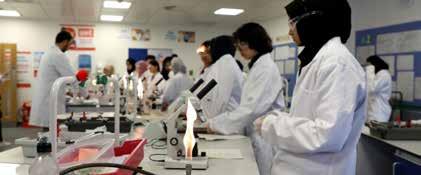
Studying Chemistry is essential for HE courses and careers in Medicine, Dentistry and Veterinary Sciences. Former students have also progressed into Chemical Engineering, Forensic Science and Pharmaceutical Science. The skills you gain, including analytical and problem-solving skills, will also be valuable for a broad range of careers.
All lessons are delivered in state-of-the-art laboratories. All students studying a science course are able to become a Science Ambassador. This allows students to take part in events both at college and external trips to local universities and to promote science to younger students from local secondary and primary schools. Students have the opportunity to take part in trips and to improve their skills through extra practical activities and presentations. They spend the day at Huddersfield University during Science Week, carrying out a series of interesting experiments in their modern laboratories.
A team of students is also selected to take part in the annual Royal Society of Chemistry “Schools’ Analyst” competition held at Manchester University; the College frequently gives a very good account of itself at this challenging event. Students are also encouraged to explore Chemistry beyond the realms of A level by taking part in the Cambridge Chemistry Challenge (Year 12) and the RSC Chemistry Olympiad (Year 13) each year. This course cannot be studied as part of a blended programme.
Pathway: A Level Exam board: Eduqas
Assessment Year 1 and Year 2: 80% Exam; 20% Coursework
Study the ‘ins and outs’ of Computer Systems focussing on the development of strong computational, algorithmic, and problem-solving skills.
You will study everything from the impact of smart devices you use every day, to advancements in quantum computing.
You will also develop your independent programming skills to create advanced systems from the ground up.
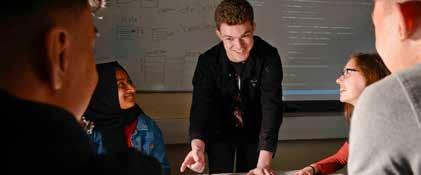
From this course, students will have the option to go onto a range of university courses across the country to study Computer Science, Software Engineering, Cyber Security, App. Design and Development, Games Design and Creation Degrees.
In addition to this, there are a large range of degree apprenticeships and direct employment opportunities.
Even with no programming skills, we start from the ground up to ensure you become an excellent programmer over the course of 2 years. We run and take part in a number of activities and trips such as:
• Hack Manchester (OSFC Hack Events)
• Great British Olympiad (Cambridge University)
• Aucoda Programming Program
• University Trips
• Amazon Fulfilment Centre
• Bletchley Park
• Manchester Airport
• Overseas Trips (Berlin and Brussels)
Pathway: Blended Exam board: WJEC
Assessment Year 1 and Year 2: 50% exam; 50% assignment/controlled assessment
This qualification looks at the types of crime that take place within our society. How do we decide which behaviour is criminal? How do we explain why some people commit crime and how can we use different theories of criminality to explain this behaviour?
You will study real life cases in order to gain an understanding of the criminal justice system from the crime scene, all the way to the courtroom and look at how social control is achieved within our society.
If you have a genuine interest in understanding a criminal’s mind; you want to understand the different types of crime; and you want to understand how crimes lead to different punishments, then this could be the course for you.
Studying Criminology will give you lots of options for your career, especially if you are interested in working with criminals or within the judicial system. This is because it develops a number of valuable transferable skills.
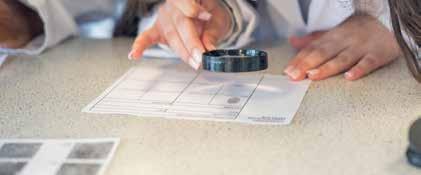
Examples of careers are: detective/police work, pathologist, teacher, prison officer, probation officer, researcher, boarder force officer, forensic analyst, paralegal/solicitor/roles within the court system, local government officer, and youth justice worker.
Criminology integrates psychology, sociology and law and is also taught by a varied team of staff across departments. There are opportunities to go on visits, trips and to experience guest speakers. Access to bespoke workshops is organised, if additional support is needed.
Pathway: A Level Exam board: AQA
Assessment Year 1 and Year 2: 50% Written Exam; 50% Practical Exam
If you’re passionate about Dance and enjoy expressing yourself through creative and imaginative choreography, then A Level Dance at OSFC is for you. You’ll have the opportunity to perform regularly in lessons and college shows, produce your own choreographies and learn to work together with other performers. You’ll also improve your knowledge and understanding of contemporary and jazz dance by studying the work of professional companies and choreographers. Entry onto the A Level course requires you to attend a taster session prior to enrolment and previous experience in dance training is desirable.
WHERE WILL THIS LEAD?
A Level Dance will prepare you for a career in the arts industry. Students have furthered their studies at Urdang Academy, The Hammond School, LMA, Bird College, Shockout Arts, Centre Pointe, Salford University, Middlesex University and Edge Hill. There is also a strong record of progression onto foundation courses at Dance Conservatoires, such as Northern Contemporary Dance School and Liverpool Institute of Performing Arts (LIPA).
Former students have launched careers as performers, teachers, dance movement therapists, arts journalists, arts administrators & sport development leaders.
• Annual theatre trip, Dance Showcase, Workshops (Rambert, delivered by dance artists in the industry and from past students), Dance enrichment opportunities, Annual musical production, Technical support, and Multiple rehearsal spaces.
• Phoenix Dance Youth Academy: Train with the UK’s leading contemporary dance company outside of London. Audition and be part of the youth academy - anyone from the ages 13-18 can audition! But as an OSFC student you will access exclusive workshops, events and industry talks with them.
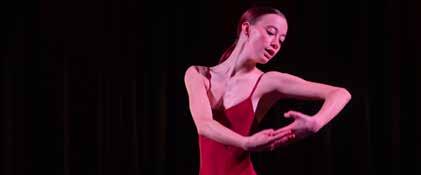
Pathway: T Level Exam board: Edexcel
Assessment Year 1:
67% Exams; 33% Project
Assessment Year 2: 100% Coursework
Pathway: A Level Exam board: Edexcel
Assessment Year 1 and Year 2:
40% Written Exam; 60% Practical Exam
This T Level course is designed to help you gain the skills you need and to prepare you for the digital sector. You will study the skills needed to develop software and apply programming skills to solve problems. In the first year, you will sit exams and look at an employer set project to test your skills and in the second year, you will develop a full software project using your newly learned skills.

T Levels come with UCAS points, so students can go onto Higher Education courses or you have the choice of an apprenticeship. With the industry experience you will gain, there is also an option for moving straight into the world of work.
You will utilise the skills gained on the course on a fantastic nine week industry placement. We have partnered with some amazing digital companies across Greater Manchester, to offer students the very best placements.
As a Drama & Theatre student, you’ll study a range of texts from various playwrights, from 19th Century drama, right up to current contemporary work. You’ll work on these practically and theoretically and develop your skills as a performer, through both individual and ensemble work, experimenting and exploring different styles and conventions. As a budding performer, you will have lots of opportunities to perform in front of an audience in our fantastic purpose built theatre and our black box rehearsal space.
Many of our students have gone on to prestigious universities and stage school to study a diverse range of creative courses. Recent examples include:
• Central School of Speech and Drama – Acting/Physical Theatre/Education
• Royal Academy for Dramatic Arts (RADA) – Acting
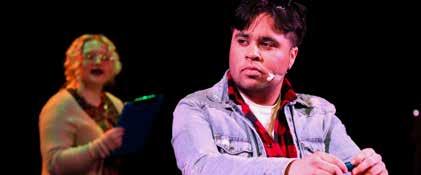
• ALRA (Academy of Live and Recorded Arts) – Acting and Performance
• Manchester Metropolitan University – Drama and Creative Writing
• The University of Salford – Broadcast Journalism/ Television and Radio
Drama and Theatre students are well supported, with excellent practical resources, including a fully functional theatre space, which also operates a professional sound and lighting desk, as well as a black box studio space. There are also shared practice rooms and access to the dance studio space. As practical work forms a substantial part of the course, we recommend and encourage students to get involved in the very popular annual college production. Performing in our productions allows students to gain experience performing for a large audience and working collaboratively as part of an ensemble cast whilst forming strong relationships with their peers. Drama students are also able to take part in our annual trip to London, where we have visited the the West End, National Theatre and Barbican Centre on previous trips.
Pathway: A Level Exam board: AQA
Assessment Year 1 and Year 2:
100% Examination
As the global human population has grown rapidly to 7.7 billion, how do we decide to use our scarce resources (land, water, food etc), what should we produce and how should goods be distributed?
You will debate the economic issues which are at the heart of our wealth and wellbeing today; these range from wealth inequality to globalization, the impacts of climate change to unemployment and inflation.
Why does Oldham have one of the worst unemployment rates in Greater Manchester, and what solutions can you offer as an economics student?
Students have recently gone on to study: Economics and Social Sciences, Business Economics, Economics and Finance, International Business and Economics and Politics. Career options include roles such as Financial Analyst, Government Policy Analyst, Market Research and many more across a wide field of sectors.

The skills developed in A Level Economics and degree level Economics are valued and respected by employers.
• Pre-University courses at The University of Manchester
• Explore and Discover Economics trips to The University of Manchester
This course cannot be studied as part of a blended programme.
Pathway: T Level Exam board: NCFE
Assessment Year 1: 70% Exam; 30% Coursework
Assessment Year 2: 100% Coursework
The Education and Early Years T Level gives you an opportunity to learn about the education sector and you will develop the skills required for threshold occupational competence.
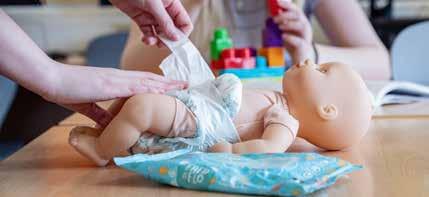
You will gain knowledge of the holistic needs of children from 0-18 years and will apply theoretical knowledge to educational concepts.
You will learn how to plan learning experiences, how to manage behaviour and how to communicate with parents and carers.
You will also gain understanding of child development, including special educational needs. The course teaches you how to be a reflective practitioner and how to ensure the wellbeing of children.
T Levels come with UCAS points, so you can go onto Higher Education courses at university or you have the choice of an apprenticeship.
With the health sector experience and skills you will gain, there is also an option for moving straight into the world of work.
The occupational specialism for this T Level is the Assisting Teaching Pathway. You will be given an extremely valuable placement in a local Primary School where you will gain first hand industry experience.
Pathway: A Level Exam board: Eduqas
Assessment Year 1 and Year 2: 80% Examination; 20% Coursework
Electronics is a practical subject in which we cover the skills and knowledge required to design, make, test and modify circuits to meet an agreed project target. With knowledge of this subject, you will always be in demand because modern society is dependent on electronics, whether it be for communicating, controlling machines, processing information on computers or using modern medical techniques.
An exciting feature is the coursework, which consists of individually chosen projects.
Electronics is an ideal stepping-stone to HE courses in Engineering, Computing and Science and careers in areas such as the electronics industry, avionics, IT and engineering. You will be able to develop analytical and problem solving skills, as well as learn how to use your initiative to develop solutions.

Our specialised Electronics laboratory means that you will have the opportunity to gain a wide range of practical and analytical skills in designing, building and testing electronic circuits. You will have the opportunity to help out in the OSFC Regional Science Centre and get involved with primary science, Nuffield placements and STEM activities, during British Science Week. All students studying a science course are able to become a Science Ambassador. This allows students to take part in events both at college and external trips to local universities and to promote science to younger students from local secondary and primary schools.
Pathway: A Level Exam board: AQA
Assessment Year 1 and Year 2: 80% exam; 20% coursework
The study of AQA A Level English Language allows you to develop a critical understanding of a wide variety of texts, both written and spoken. You will be guided through the fundamental building blocks of language and its use: grammar, structure and style.

Your analytical skills will be developed as you break texts down, learning how writers have created particular effects for specific audiences and purposes.
One of the most desirable skills employers look for is good communication skills; the ability to explain, write or present ideas clearly and concisely is essential. That means English Language is a qualification valued in any job that involves communication, writing and/or literary knowledge, such as marketing, journalism, law or business.
However, your English skills are valued in scientific, engineering, technological and mathematical careers too. This is because writing proposals, academic papers, articles and communicating with others is vital in these fields to promote the work undertaken and gain funding for projects.
• Creative writing, for those who enjoy writing stories and poems and for students who are particularly interested in following a career involving writing.
• Theatre and lecture visits.
• Guest lecturers from universities and bespoke workshops.
“The teachers are so amazing and I was provided with the perfect opportunities to express my passions, masterfully guided by my teachers. They created a fun and studious atmosphere.”
A*AA in Fine Art, Film Studies and History. Jess is now heading off to University of Manchester to study Film Studies and History.
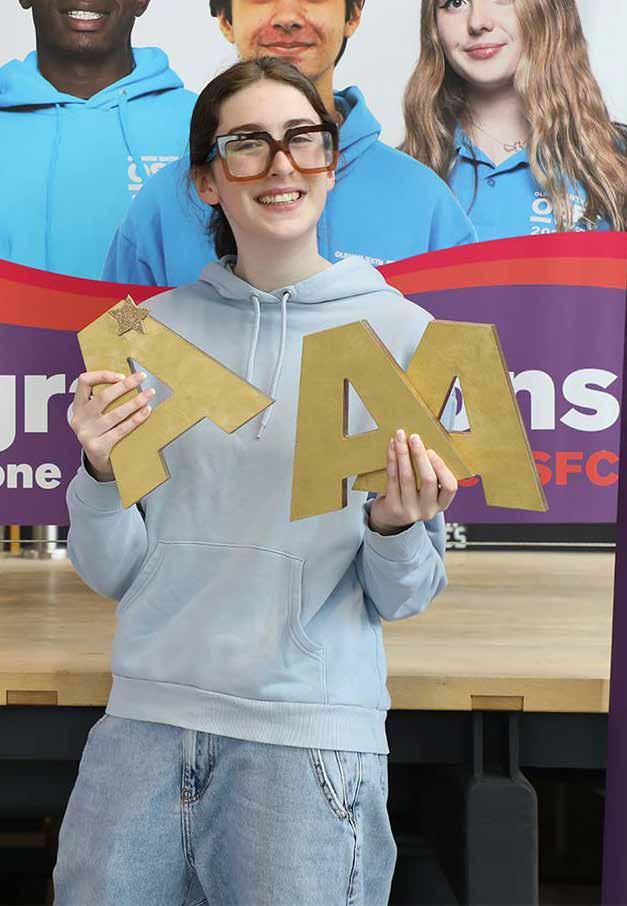
Pathway: A Level Exam board: AQA
Assessment Year 1 and Year 2: 80% exam; 20% Non-Examined Assessment
WHAT WILL YOU LEARN?
Do you love reading novels, plays and poems, but also want to learn how spoken language works in real life? Do you think you would enjoy reading literature texts alongside a selection of non-fiction genres, such as travel writing, autobiographies and memoirs? Then our English Language & Literature course is for you because it allows you to continue studying both language and literature as a single A Level. We study modern literature texts, such as Khalid Hosseini’s ‘The Kite Runner,’ Margaret Atwood’s ‘The Handmaid’s Tale’ and Tennessee Williams’ ‘A Streetcar Named Desire,’ which cover themes surrounding identity, relationships and power.
If you enjoy creative writing, then you will particularly enjoy the unit on ‘The Kite Runner’, as we re-write sections of the novel from different characters’ perspectives in order to understand more about what writers do when they create viewpoints and characters.
WHERE WILL THIS LEAD?
A Level English Language & Literature builds your reading, writing and analytical skills, all vital skills for jobs in a wide range of careers from those in the creative industries to careers in law, business, education and politics.
Our English Language and Literature course allows you to carry on with both Literature and Language without having to choose between the two.
If you like modern literature and creative writing, then this could be the right English course for you. We study poems, plays and novels alongside non-fiction texts like travel writing, memoirs and spoken language texts.
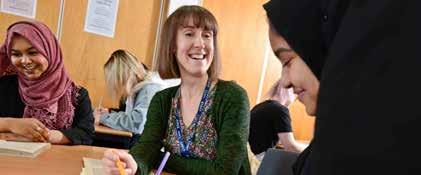
Pathway: A Level Exam board: OCR
Assessment Year 1: 100% Exam
Assessment Year 2: 80% Exam; 20% Coursework
Pathway: A Level Exam board: Eduqas
Assessment Year 1 and Year 2: 70% Exam; 30% Coursework
As a student of English Literature, you will delve into a wide range of novels, plays and poems with an open and inquisitive mind. Students of English Literature read widely and independently, both set texts and others that they have selected for themselves.
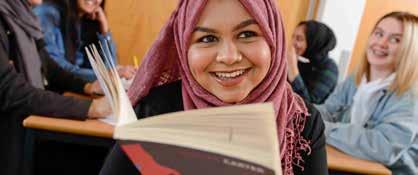
You will be guided to engage critically and creatively with a substantial body of texts and ways of responding to them. Developing and effectively applying your knowledge of literary analysis and evaluation in writing is another essential skill that you will gain.
By examining a wide range of texts, from modern masterpieces to classic works, you will see how literature reflects the political and cultural struggles of the time in which they are written. This course may even change the way you think about and view the world.
English Literature is a highly regarded subject by all employers and universities. Popular careers for those with English Literature A Level include law, journalism, academia, writing, politics, banking, museums, education, media and the civil service. English Literature is valued, not only because it is a challenging course, but because it helps you develop key skills, including the ability to develop arguments, think analytically, evaluate evidence and write fluently and coherently. These skills are prized by Russell Group universities as well as Oxford and Cambridge.
Enhance your independent research skills with our Extended Project Qualification Xtra. You’ll also have the opportunity to enhance your learning through trips to London and Stratfordupon-Avon. Guest lectures from experts in their field. Past visitors have included Poet Laureates Carol Ann Duffy and Simon Armitage.
This course cannot be studied as part of a blended programme.
The course aims to broaden and deepen your appreciation of films from a wide range of geographical and historical contexts. You will explore the ‘language’ of film – the conventions and techniques used by filmmakers to communicate to audiences and provoke in them a variety of emotional and intellectual responses. You will learn to use theories and concepts to approach film in a critical and analytical way; and also develop skills in producing your own filmic artefacts. Films you will study include Shaun of the Dead, City of God, Pulp Fiction, and Pans Labyrinth
Typically students’ progress onto a Film or Media related degree courses and plan for a career in one of the many growing areas across the media industries. However, the skills and understanding gained in Film Studies also equip students to progress into a variety of career paths, many of which value and desire the new presentational, creative and analytical talents of Film students. Destinations of recent Film students include:
• King’s College London – Filmmaking
• Becket College Leeds – Filmmaking
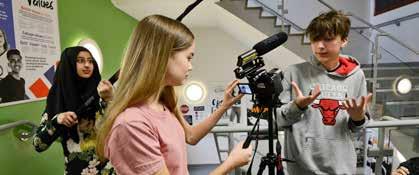
• Oxford University - History
• Manchester Metropolitan University – Creative Writing Led Community Practices
• Edge Hill University – Media, Film and Television
• Liverpool John Moores – Film Studies
We organise trips and events, which aim to supplement and extend your knowledge of film and the cinema industry. In previous years, students have attended the International Documentary Film Festival in Sheffield and the London Film Festival. We have visited the headquarters of The British Board of Film Classification in London to see how the BBFC makes decisions about classification. Students have also submitted their work to the Eduqas Moving Image Award competition. We also attend study days at HOME in Manchester.
Pathway: A Level Exam board: OCR
Assessment Year 1: 100% coursework, 1 component
Assessment Year 2: 100% coursework, 2 components
Special entry requirements: A minimum grade 4 in an Art subject at GCSE is required. Exceptions may be made for able students who can supply a portfolio of work at enrolment.
You will develop skills in Fine Art through projects that encourage you to investigate, create and discuss ways of working.
You will undertake primary and secondary research, drawing, sketching and painting, using digital software, developing ideas, reviewing and refining in order to create coherent final outcomes. This process will enable you to express yourself and also develop your appreciation of the work of others.
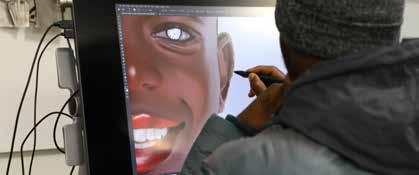
Fine Art is a highly regarded subject by all employers and universities. The Fine Art A Level helps you develop your creative skills and attention to detail and is ideal for careers and HE courses in all areas of design, cultural studies, media, architecture and engineering.
You will have the opportunity to extend your learning through art trips, including our visits to London, Manchester and Liverpool.
We welcome visiting artists and past students presenting portfolios of work and discussing their creative journeys.
There are opportunities to exhibit online with some of the major galleries, such as SaatchiArt.com and to experience live briefs which the creative industries offer.
Pathway: A Level Exam board: Edexcel
Assessment Year 1: 100% Exam
Assessment Year 2: 80% Exam; 20% Coursework
If you enjoy learning about the natural and human environment and issues that affect our lives, now and in the future, then this is the course for you.
You will focus on the interaction between people and the environment and the understanding and management of the world today.
You will study physical geography topics such as plate tectonics, coastal processes, the water cycle and water shortage and the carbon cycle and the energy question. Human geography topics include superpowers, globalisation, shaping places (regenerating places) and human health and intervention.
Within both physical and human geography, you will develop your geographical skills along with applying fieldwork skills.
A Level Geography is highly regarded by Russell Group universities as well as Oxford and Cambridge. Geography is popular for a number of careers including surveying, town and country planning, landscape architecture and environmental studies.
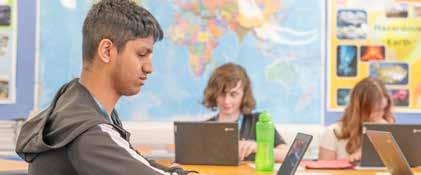
As a Geography student, you will develop your problem solving, teamwork and analytical skills, along with organisation and communication skills which are highly regarded by both employers and Russell Group universities.
You will also have the opportunity to see Geography in action during field trips to take full advantage of the variety of natural and human landscapes. These include local human investigations in Oldham and Manchester and physical investigations to coastal environments such as the Holderness coastline and Sefton coastline. This course cannot be studied as part of a blended programme.
Pathway: A Level Exam board: OCR
Assessment Year 1 and Year 2: 100% Coursework
Special entry requirements: A minimum grade 4 in an Art subject at GCSE is required. Exceptions may be made for able students who can supply a portfolio of work at enrolment.
Graphic Design will introduce you to the exciting, stimulating and constantly changing world of visual communication.
Whilst studying the work of both contemporary and historical practitioners in this field, you will have the opportunity to explore a variety of genres and be introduced to a range of media, techniques and processes to effectively express your ideas. These ideas will then be developed through experimentation and through the production of graphic outcomes, such as poster design, packaging, advertising, branding, magazine layout and illustration.
On the course, you will also learn how to use industry standard design software such as Adobe Photoshop and Adobe Illustrator, which will prepare you for higher education and a career in design.
Studying Graphic Design opens up careers and HE courses in all areas of design including graphic design, advertising, illustration, animation, magazine design and games design. It will help develop your creativity, attention to detail and communication skills. Former students are now studying Graphic Design, Games Design, Illustration and Architecture at universities across the UK.
Access to high quality facilities in the Art department, including digital labs equipped with up to date design software, Wacom drawing tablets and Cintiqs, light boxes, high quality printers, camera equipment and access to our photography studio.
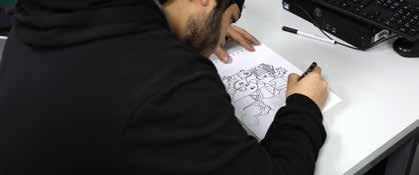
You will have the opportunity to go on a range of trips, including international residentials and galleries of London and Manchester. There are visits to the Pre-Degree Foundation and degree shows at Manchester Metropolitan University and the Pre-Degree Foundation course at The Oldham College. We also provide the opportunity to visit industry professionals.
–––
Awais Ahmad
A*A*B in Business Studies, Economics & Politics. Awais is now heading off to study Business with Accounting at University of Manchester.
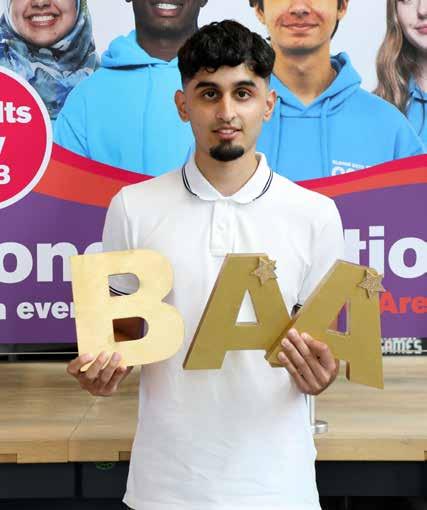
“Great college, the teachers have been key to my success.”EXPLORE THIS PATHWAY FURTHER
Pathway: T Level Exam board: NCFE

Assessment Year 1: 70% Exam; 30% Coursework
WHAT WILL YOU LEARN?
Assessment Year 2: 100% Coursework
Pathway: Blended Exam board: OCR
Assessment Year 1 and Year 2: 50% exam; 50% coursework
WHAT WILL YOU LEARN?
The T Level in Health is designed to help you gain the knowledge and skills you need for the health sector.
During your first year, you will study examined topics on the health and science sector, including providing person-centred care, good scientific and clinical practice, infection control and health and wellbeing.
You will also complete an employer set project where you will demonstrate the wider skills you have learnt. In the second year, you will focus on an occupational specialism (supporting adult nursing), where you learn ‘on the job’ skills to support adult nurses in their daily and clinical tasks.
WHERE WILL THIS LEAD?
T Levels come with UCAS points, so you can go onto Higher Education courses at university or you have the choice of an apprenticeship.
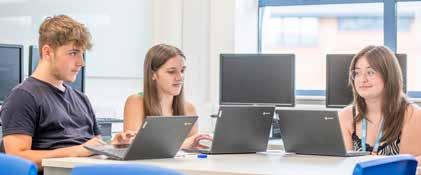
With the health sector experience and skills you will gain, there is also an option for moving straight into the world of work.
This course includes an extremely valuable placement within the health sector, where you will be able to use the skills you have learnt on the course.
You will gain an insight into a health professional’s occupation and learn ‘on the job’ skills where you can see first-hand what it is like to work on the front line.
If you are considering a career in the NHS, social care or teaching, this course is an excellent choice. You’ll develop the skills required to build positive relationships with your service users and learn about the concepts of equality and diversity, which could impact on their lives.
You’ll also study anatomy and physiology, infection control and physiological disorders, giving you an insight into the diagnosis, treatment and management of common diseases.
For those students who are pursuing a career in the competitive fields of nursing, paramedic science, midwifery and other NHS careers, we have an option to specialise in the more scientific units, providing students with more science content to strengthen their university applications.
WHERE WILL THIS LEAD?
• Adult Nursing
• Paediatric Nursing
• Mental Health Nursing
• Social Work
• Paramedic Science
• Midwifery
• Teaching
• Psychology/Sociology/Law/Early years degree
• Employment in the adult social care or childcare sectors
As part of this course, a range of work experience placements will be organised for students. Possible settings include hospitals, care homes, nurseries and schools. Students will carry out the work experience throughout the year and reflect on this through their studies.
2ND YEAR
Students will complete a First Aid Qualification and the The Care certificates as part of the course.
Pathway: Vocational Exam board: OCR
Assessment Year 1 and Year 2: 30% exam; 70% coursework
If you are considering a career in the NHS, social care or teaching, this course is an excellent choice. You’ll develop the skills required to build positive relationships with your service users and learn about the concepts of equality and diversity, which could impact on their lives. You’ll also study anatomy and physiology, infection control and physiological disorders, giving you an insight into the diagnosis, treatment and management of common diseases. For those students who are pursuing a career in the competitive fields of nursing, paramedic science, midwifery and other NHS careers, we have an option to specialise in the more scientific units, providing students with more science content to strengthen their university applications.
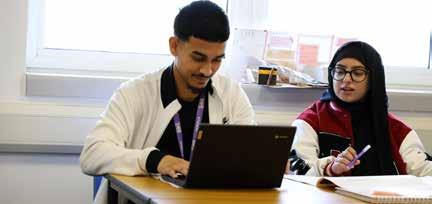
WHERE WILL THIS LEAD?
• Adult Nursing
• Paediatric Nursing
• Mental Health Nursing
• Social Work
SPECIAL FEATURES
• Paramedic Science
• Midwifery
• Teaching
Pathway: A Level Exam board: Edexcel
Assessment Year 1: 100% Exam
Assessment Year 2: 80% Exam; 20% Coursework
You will discover the past. You’ll also gain a deep knowledge of society, culture, economics and politics; master the valuable skill of persuasive, evidence based arguments in both class debate and written work; become a creative, independent thinker and learn how and why to question the world around you. You will also learn to appreciate that people in the past were not simply ‘good’ or ‘bad’, but motivated in complex and inconsistent ways; just like people today, just like you.
History is a highly regarded subject by all employers and universities. Popular careers for those with History A Level include law, journalism, academia, writing, politics, banking, museums, education, archaeology and the Civil Service.
• Psychology/Sociology/Law/Early years degree
• Employment in the adult social care or childcare sectors
History is valued not only because it is a challenging course, but because it helps you develop key skills including critical evaluation, evidence based argument, research, organisation and communication skills.
These skills are prized by Russell Group universities as well as Oxford and Cambridge.
Special Features for the Health & Social Care Extended Diploma are the same as the Single Diploma, please see previous course for this information.
2ND YEAR
Students will complete a First Aid Qualification and the The Care certificates as part of the course.

• You’ll have the opportunity to enhance your learning through trips, including our popular trip to Berlin and Krakow, in addition to guest lectures from experts in their field.
• Stand out and reveal knowledge beyond the exam specification with challenging extension workshops.
• Guest speakers from universities.
• If you’re ever stuck, you can access extra support through workshops.
• Enhance your independent research skills with our Extended Project Qualification Xtra.
D*D*D* in Sport. Evie is now progressing onto University Academy 92 to study Physical Education.
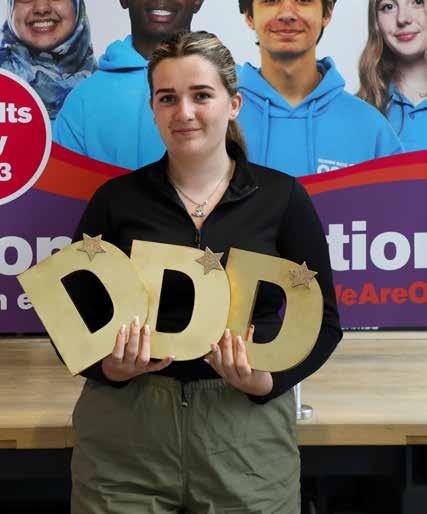
Pathway: Blended Exam board: OCR
Assessment Year 1: 50% Exam; 50% Coursework
Assessment Year 2: 40% Exam; 60% Coursework
Information Technology influences nearly all aspects of our lives and will do for years to come. If you are interested in computers and want to learn more about how they can be used to solve real life problems and the impact that they are having on society, business and the environment, then this course is for you. All of the topics are focused on the ‘now’ of Information Technology and the world of computing.
HE courses include Software Engineering, Multimedia, Computing, Cyber Security, Games Development, Hardware Engineering and Web Page Development, Animation and Network Technology.
A growing number of our IT students are now pursuing the apprenticeship route, with Greater Manchester being seen as a major computing and technology hub. Many of these are linked to local universities for Level 4 accreditation.

An understanding of Information Technology is useful for a career in any modern industry. The world is now almost totally reliant on computers and IT. Many of today’s students are being prepared and trained for jobs that don’t yet exist, but which may become vital in a few years’ time.
As part of the course, useful links with employers will be formed - placements and employer input into assignments.
Trips take place throughout the year, including a day at Amazon’s distribution centre.
Evie Jones
“Wonderful courses full of incredible support from teachers that go out of their own time to help with lunch workshops or whenever you need. Cannot recommend enough!”
Pathway: Vocational Exam board: OCR
Assessment Year 1: 50% Exam; 50% Coursework
Assessment Year 2: 40% Exam; 60% Coursework
Pathway: A Level Exam board: OCR
Assessment Year 1 and Year 2: 100% Exam
Information Technology influences nearly all aspects of our lives and will do for years to come. If you are interested in computers and want to learn more about how they can be used to solve real life problems and the impact that they are having on society, business and the environment, then this course is for you. All of the topics are focused on the ‘now’ of Information Technology and the world of computing.
HE courses include Software Engineering, Multimedia, Computing, Cyber Security, Games Development, Hardware Engineering and Web Page Development, Animation and Network Technology.

A growing number of our IT students are now pursuing the apprenticeship route, with Greater Manchester being seen as a major computing and technology hub. Many of these are linked to local universities for Level 4 accreditation.
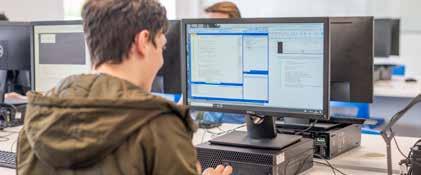
An understanding of Information Technology is useful for a career in any modern industry. The world is now almost totally reliant on computers and IT. Many of today’s students are being prepared and trained for jobs that don’t yet exist, but which may become vital in a few years’ time.
Special Features for the Information Technology Extended Diploma are the same as the Single Diploma, please see previous course for this information.
As a Law student at OSFC, you will develop the knowledge and skills to debate important concepts such as justice and equality. You will learn how law is made and understand its operation and effect on our everyday lives in England and Wales. You will study areas of criminal, tort and contract topics, as well as the nature of law. Legal approaches for non-fatal offences, fatal offences, negligence and aspects of law and morality justice will be debated.
Law is a highly regarded subject by all employers and universities. Those with Law A Level go into careers as solicitors, barristers, civil servants, politicians, bankers, teachers, legal executives, criminal psychologists and police officers. Law is valued not only because it is a challenging course, but because it will enable you to develop and apply the techniques of legal method and reasoning to analyse and offer answers to legal problems, based on legal rules and principles and develop the ability to construct and communicate legal arguments by reference to appropriate legal authorities. You will develop your critical awareness of the law throughout the course.
Trips to the Crown Court and Magistrates Court in Manchester, mock trials, a residential trip to London including visits to parliament, the supreme court and the Royal Courts of Justice. There is also a trip to Salford University, talks from current university Law students, universities and professionals.
Here at OSFC, we have our very own Amnesty youth group. As part of this Xtras programme, you will be campaigning and fundraising against breaches of human rights across the world. You will work as a group to develop campaign ideas, whether that be letter writing, holding cake sales, signing petitions or making videos. It will help you develop transferable skills such as communication, research, creativity and organisation. If you are a student passionate about human rights, then this group is for you. We run an Aspiring Law Programme (ALP) to demystify the process of applying for a Law Degree at University and hear the first-hand experiences of past students, who have forged a career in the legal profession.
Pathway: Blended Exam board: Edexcel
Assessment Year 1: 50% Exam; 50% Coursework
Assessment Year 2: 67% Exam; 33% Coursework
Pathway: A Level Exam board: Edexcel
Assessment Year 1 and Year 2: 100% Exam
Special entry requirements: Grade 6 in GCSE Maths.
Studying Law at OSFC, you will learn the processes behind the creation of new laws, its operation and effect on our everyday lives, who is responsible for administering justice and to what extent they are doing so fairly.
On this course, we study criminal, tort and family law as core topics and, throughout your studies, you will develop the essential skills to set you on your way to becoming a legal professional. These include independent research skills, analysis, problem solving and critical evaluation. So if you have always wanted to know the inner workings of a court room and exactly how lawyers defend their clients in court, then this is the course for you!
WHERE WILL THIS LEAD?
Studying vocational Law can lead to study at university or careers in the legal profession, police, prison service, businesses, and the Civil Service. When studying Law, you will develop employability skills such as problem solving, organisation and communication skills valued by Higher Education institutions and employers alike.
Fight for justice by joining our Amnesty International group and advocate for our Human Rights. You’ll also have the opportunity to enhance your learning through trips, including our popular residential trip to London, as well as visits to the local courts. We also have a strong relationship with Universities and you can get a taste of life as an undergraduate Law student on a University Campus for the day.
Guest lectures from legal professionals visit us and our Aspiring Law Programme helps demystify the process of applying for a Law Degree at University and hear the first-hand experiences of past students, who have forged a career in the legal profession.
The Mathematics A Level covers three areas of study: pure, mechanics and statistics. All three are compulsory. Pure Mathematics continues on from your GCSE studies. Algebra, geometry and trigonometry are all covered along with a new topic: calculus. Statistics covers sampling, probability and hypothesis testing, along with the studying of a real-world large set of data.
Mechanics covers motion with constant acceleration, the application of forces and friction. Through studying A Level Mathematics, you will develop three key skills: problem solving, technical accuracy and the interpretation of mathematical models in the real world.
Mathematics can lead to a wide variety of HE courses and careers, such as Engineering, Economics, Mathematics, Physics, Accountancy, Architecture and Actuarial Science.
Former students are currently studying a broad range of courses, including Mathematics, Financial Mathematics and Astrophysics and Mathematics. Mathematics A Level is a highly valued qualification and those who succeed on the course are sought after by both universities and employers.
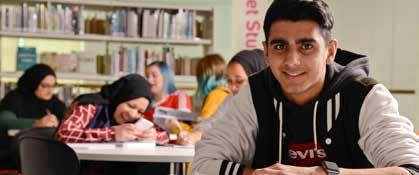
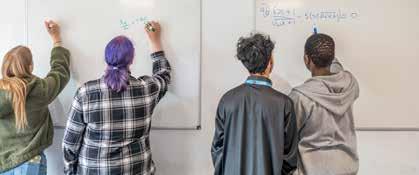
Trips are run each year to the Maths Inspiration Lectures and the problem solving events run in partnership with Manchester University. Additionally, you will have the opportunity to take part in the Senior Maths Challenge and the Senior Maths Team Challenge. This course cannot be studied as part of a blended programme.
Pathway: A Level Exam board: AQA
Assessment Year 1 and Year 2:
100% Exam
Special entry requirements: Grade 7 in GCSE Maths.
If you are a strong and enthusiastic mathematician, then Further Maths is the course for you. Further Mathematics explores the topics introduced in A Level Mathematics to a greater depth and introduces brand new topics that do not follow on from GCSE Maths. As with A Level Mathematics, you will study topics in three areas: pure maths, mechanics and statistics. As well as deepening your mathematical knowledge, the topics you study will introduce you to mathematics as it is applied to Physics, Computer Graphics and the Statistical Sciences.
Further Mathematics will prepare you for studying Mathematics, Physics and Computer Science at university, and will open up careers in accountancy, engineering, finance and actuarial science.
SPECIAL FEATURES
Trips are run each year to the Maths Inspiration Lectures and the problem solving events run in partnership with Manchester University. Additionally, you will have the opportunity to take part in the Senior Maths Challenge and the Senior Maths Team Challenge.
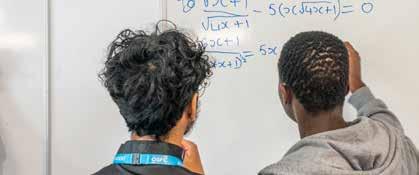
This course cannot be studied as part of a blended programme.
Pathway: A Level Exam board: Eduqas
Assessment Year 1 and Year 2: 70% Exam; 30% Coursework
We engage with a broad spectrum of media forms, including music video, gaming, film marketing, TV and online media.
Our focus is on how the media shapes the world we live in, how audiences engage with particular texts they love and also how the media uses its power when we look at media businesses.
You will reflect on the work of many different media theorists and consider their thinking regarding the texts we examine.
As well as this academic approach to media, there is the opportunity to be creative in the making of your own media products, in the 30% coursework component.
Media Studies can take you into a variety of worlds where creative and analytical skills are required. At HE level, there are now many different subject related degrees based in theory or production, but there are also many other areas such as advertising, communication, design, fashion, journalism and technology.
You can take part in a trip to London to find out more about how the media operates. There are many opportunities to hear from expert university speakers, who help shed light on some of the complex issues we consider in the subject.
You will study in dedicated and subject specific facilities, such as editing suites and production spaces.
Please be aware that you will need to study Maths alongside Further Maths.
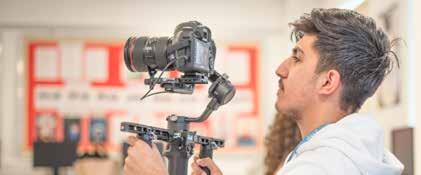
Pathway: A Level Exam board: AQA
Assessment Year 1 and Year 2: 100% Exam
You will study aspects of contemporary life in France and French speaking countries and at the same time learn how to express your ideas with more complex language and understand more advanced spoken and written texts. Listening, written, reading and spoken skills are practised in equal measure in classrooms devoted to language learning. Grammar and language structure will also be a key ingredient in your programme. Cultural works will be studied, which include film and literature and form the basis of essays written as part of the final assessment.
A qualification in a foreign language is an excellent asset for any career or university pathway. Increasingly, in our global society, employers and educational institutions are very keen to recruit those with an international aspect to their CV. Previous students have gone on to study languages at universities across the world including Russell Group institutions. Many have chosen to stay within the North West, where there are many excellent language departments. Linguists from OSFC have gone on to work in many sectors including the chemical industry, the Air Force, law, teaching, marketing, the Civil Service and in the media.
As well as four weekly sessions devoted to all language skills, you will have weekly contact with a French Assistant where you will be able to develop your language competence privately in one-to-one sessions. Trips to the Manchester universities for special language events and to other exhibitions and cinema attractions are regularly offered. Students are also encouraged to take part in competitions aimed at aspiring linguists. In addition to your A Level course, you could also take up an Xtras course that gives you the chance to learn a new language over 14 weeks or to develop your practical skills in an existing language at post GCSE level (German, French, Mandarin or Spanish). The course focuses on developing speaking and listening skills in a vocational context for particular use in future employment.
Pathway: A Level Exam board: AQA
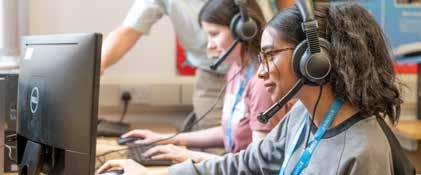
Assessment Year 1 and Year 2: 100% Exam
During your first year, you will build upon the knowledge that you have gained from your GCSE course. You will study a wide variety of aspects of the social and cultural life of Spain, and you will also study a well-known film in detail. To improve your language use, you will develop your skills in listening, reading, speaking and writing though studying a range of modern texts.
In your second year, we will consider some political aspects of the country you are studying and closely examine some works of fiction. Throughout the course, you will be taught about the building blocks of the language and will practise the grammar.
Knowledge of a modern foreign language is useful in a range of different careers, including translation, business, law, tourism and marketing. Knowledge of a language will help in any career that requires communication skills, problem solving skills, initiative, flexibility or experience of other cultures. Languages are highly valued by Russell Group universities and will facilitate progression onto any degree programme.
In order to achieve high standards, we offer students the chance to participate in a memorable exchange programme with a school in Torrelavega (Cantabria) and provide all students with regular weekly contact with a Language Assistant, where you can practise speaking exercises privately. The department works closely with The University of Manchester and Manchester Metropolitan University and our students attend study days and language development activities throughout the year, as well as trips to cinemas featuring foreign films.
In addition to your A Level course, you could also take up an Xtras course that gives you the chance to learn a new language over 14 weeks or to develop your practical skills in an existing language at post GCSE level (German, French, Mandarin or Spanish). The course focuses on developing speaking and listening skills in a vocational context for particular use in future employment.
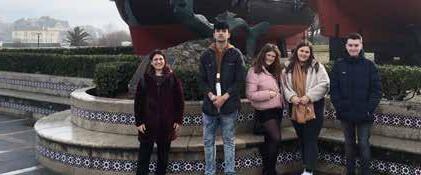
Pathway: Blended Exam board: Edexcel
Assessment Year 1 and Year 2: 100% coursework (40% internally assessed, 60% externally assessed)
Special entry requirements: Students should be playing an instrument, or singing, on a regular basis and be prepared to perform in front of others. If voice is your main instrument then you will need some ability on guitar, piano and/or music theory. We do not demand GCSE Music or instrument graded exams for entry, although they are useful.
You will develop your ability to create, arrange and perform music with other musicians in a range of popular styles. It also includes a unit on the music industry with a focus on live event planning. There is a strong focus on working in collaboration with other musicians and performers.
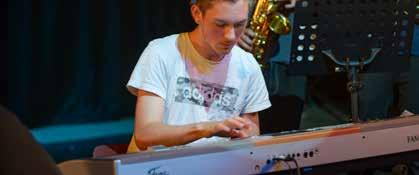
The music industry makes a vast contribution to the UK economy and continues to grow, this course will prepare you for the study of music at university and a career in this exciting and thriving industry. As well as working as performers on stages and in studios, many musicians also find work producing music for film and media, or in technical roles such as sound engineers. Even if you do not wish to pursue music as a career, the course will give you a wealth of musical experience and transferable skills which are useful and enriching in all aspects of your life.
You will be taught by an experienced professional musician who has had a top 10 album and extensive touring experience, including playing Glastonbury and other top festivals. You will have the opportunity to perform in the College Production and a range of other college events, as well as pop-up performances around college on our mobile PA. Extensive range of good quality musical instruments and equipment within the department, with well equipped practice rooms that can be booked for use outside of lesson time. Trips to recording studios and venues, along with visiting speakers from the music industry. Every music student gets an education account with Soundtrap and Flat recording and notation cloud based software which run on your college Chromebooks. You also have access to Garageband and other music making apps.
–––
Cerise Roye
Triple Distinction* in Health and Social Care (D*D*D*). Cerise is now progressing to University of Manchester, where she will study Child Nursing.
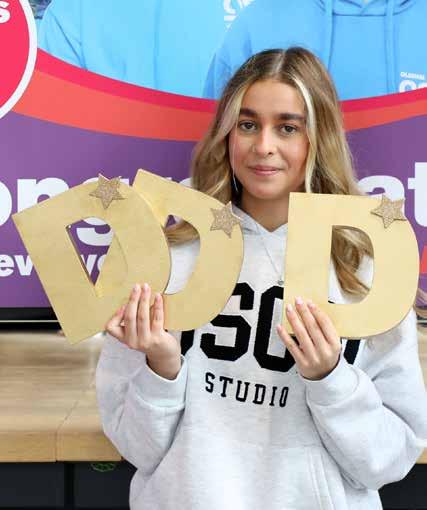
“So much help when needed, the teachers are so friendly.”
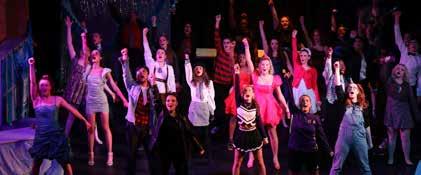
Pathway: Blended Exam board: OCR
Assessment Year 1 and Year 2: 100% coursework and practical combined
The Performing Arts course is designed for those students who want to explore the performance industry in more depth, in terms of the work available, how to network, audition and survive in this most competitive of industries. You will explore freelance and contract based work, as well as preparing for projects and performances. There is practical work involved, in terms of workshop based classes to help refine your skills. This is a particularly useful course if you want to explore the varied roles within the industry, not simply performance.
Many of our students have gone on to prestigious universities and stage school, to study a diverse range of creative courses in Dance, Drama, Musical Theatre, Education and Events Management at locations such as:
• Central School of Speech and Drama
• RADA (Royal Academy of Dramatic Arts)
• Urdang Academy
• Middlesex University
• ALRA (Academy for Live and Recorded Arts)
• Manchester Met University
• Bird College
• University College Oldham Performance
Pathway: A Level Exam board: AQA
Assessment Year 1 and Year 2: 100% Exam
Special entry requirements: Grade 5 in GCSE English Language or English Literature.
You will engage with the big questions in a secular context: Can we be sure that we really exist? How should we behave? Should we believe in God? Who/what am I? These are all questions that don’t have easy or obvious answers.
Not only will you have the opportunity to explore and debate these fundamental questions, you will also learn to be clear and precise in your thinking and writing, how to analyse and evaluate the arguments of others and how to construct and defend your own arguments. Are you prepared to open your mind to see things in a different way? Do you enjoy arguing constructively? Are you willing to tackle some thought-provoking ideas? If so, Philosophy is for you!
An A Level in Philosophy is a highly regarded qualification that will enable you to access a wide range of degree courses. It is also a good choice for careers in the legal professions, police, Civil Service and charity work.
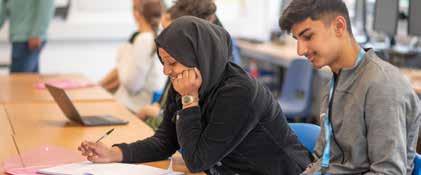
More generally, Philosophy will help you gain a range of transferable skills which are invaluable across numerous professional sectors, including critical, analytical, problem solving and communication skills.
Performing Arts students are well supported, with excellent practical resources, including a fully functional theatre space, which also operates a professional sound and lighting desk, and a black box studio space. There are also shared practice rooms and access to the dance studio space. Specialist tutors, experienced in each area of the arts, are always on hand to offer help and support, with an open door policy in order to facilitate friendly working relationships. As practical work forms a substantial part of the course, we recommend and encourage students to get involved in the very popular annual College production, often a musical theatre piece, as part of the OSFC Xtra’s programme, that allows students more experience in performing for an audience and working collaboratively as part of an ensemble cast. These productions often sell out, so offer all students the opportunity to play to larger audiences and form strong relationships with their peers.
Budding philosophers are encouraged to read widely and we discuss this in-depth in class. Some examples are:
• Philosophy: A Very Short Introduction (Edward Craig)
• The Philosophy Book: Big Ideas Simply Explained (DK Publishing)
• Philosophy 101 (Paul Kleinman)
• A Little History of Philosophy (Nigel Warburton)
• Sophie’s World (Jostein Gaarder)
This course cannot be studied as part of a blended programme.
Pathway: A Level Exam board: OCR
Assessment Year 1 and Year 2: 100% Coursework
Special entry requirements: A minimum grade 4 in an Art subject at GCSE is required. Exceptions may be made for able students who can supply a portfolio of work at enrolment.
You will enjoy Photography if you have a creative eye and are interested in experimenting with and exploring photography techniques, alongside learning what makes a photograph successful in visual terms.
On the course, you will learn about photography in different contexts with themes of work including People, Places, Abstraction and Architecture. You will be taught how to use Digital SLR cameras to create innovative photographs and also how Adobe Photoshop can be used to enhance images further.
Projects will allow you to explore ideas through a thorough design process and you will be introduced to a variety of existing photography work to inspire and inform your own creative development.
Photography leads into HE Art and Design courses or careers in graphic design, fashion, film, advertising, journalism and photography. Photography also develops a wide range of skills, including critical analysis, creativity and practical problem solving.
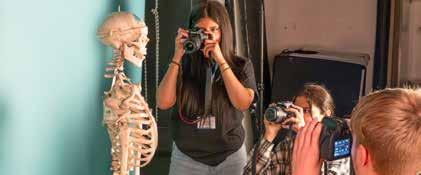
Students have gone on to study degrees in Photography, Multimedia Journalism, Fashion Design with Textiles, Graphic and Communication Design, Fashion Marketing and Branding.
You will have the opportunity to enhance your learning through trips including, visits to galleries and exhibitions in London and more locally.
You can also take part in a wide variety of student photography competitions and opportunities.
Pathway: A Level Exam board: OCR
Assessment Year 1 and Year 2: 70% Exam; 30% Coursework
Special entry requirements: You will need to be currently competing in either a team or individual sport, and continuing this during your time at college.
Have you ever wondered how your sports gear affects how fast you can sprint?
Do you know how your personality traits affect the quality of your performance and strategies you could employ to ensure you are performing at your peak?
Are you aware of how society has shaped the sport you love to compete in?
Do you know what you should be eating to get the best out of your workouts?
If you are passionate about playing and competing in your sport, Physical Education is for you.
A Level PE enables you to apply for Higher Education courses in Sports Science, Sports Management, Healthcare, or Exercise and Health. A Level PE can open up a range of career opportunities including: sports development, sports coaching, physiotherapy, sports journalism, personal training or becoming one of the next generation of PE teachers.
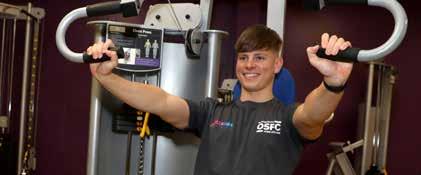
The transferable skills you learn, such as communication, analysis, evaluation, application and independent thinking, are useful in any career path you choose. Achieving an A Level in Physical Education will demonstrate to employers and universities that you are able to effectively balance your studies alongside your pursuit of excellence in the performance of your chosen sport.
Enhance your performance by participating in the College’s sports enrichment programme.
If you wish to pursue a career in the medical profession, our First Aid Course will complement your study of the human body’s systems.
You will also have the opportunity to enhance your learning through trips, including visits to university laboratories and sports stadia.
This course cannot be studied as part of a blended programme.
Pathway: A Level Exam board: OCR
Assessment Year 1 and Year 2: 100% Exam
Special entry requirements: Two Grade 5s in GCSE Science.
Physics is the most fundamental of all the sciences. You will study the physical properties of objects ranging in size from massive galaxies down to tiny sub-atomic particles. Physics is a challenging subject because it is an exact science, yet good fun because it is lively and practical.
You will develop practical skills as you complete a wide variety of experiments, illustrating and exploring the subjects studied.
Physics is essential for many Science and Engineering degree courses and particularly useful for careers in astrophysics, architecture and engineering.
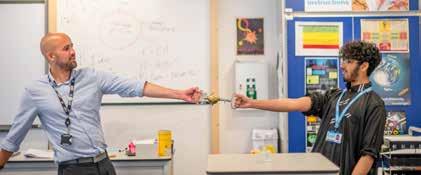
The skills you will develop are valued by employers, including the ability to construct logical arguments, pay attention to detail and approach problem solving logically.

You will study Physics in a suite of state-of-the-art laboratories full of high technology equipment, including computer data logging equipment.
You will develop your practical skills and gain a practical endorsement by completing experiments using a wide range of apparatus and techniques.
You will have the opportunity to enhance your learning through trips. Past trips have included a residential visit to CERN in Geneva, Switzerland and Reykjavik in Iceland. Guest lectures from experts in their field are open to all Physics students.
All students studying a science course are able to become a Science Ambassador. This allows students to take part in events both at college and external trips to local universities and to promote science to younger students from local secondary and primary schools. This course cannot be studied as part of a blended programme.
Pathway: A Level Exam board: Edexcel
Assessment Year 1 and Year 2: 100% Exam
Politics is the study of power, who has it and why and how it affects us all!
On the course, you will explore the mechanics of British politics, whilst also focusing on the strengths and weaknesses of our political system. You will look at who has the power and authority to make significant political decisions, which have an impact on every person, such as Brexit and climate change. You will also consider how we all participate within our democratic system from voting to joining parties and pressure groups. You will study political ideologies in depth, focusing on liberalism, socialism, conservatism and feminism and their very different perceptions on the state, the economy, freedom and the individual.
Additionally, you will study the politics of the USA, considering the US system of government and comparing it to the UK system in terms of power and decision making, looking in detail at elections and presidents such as Obama, Trump and Biden. You will look to create careful and considered arguments concerning decision-making. You will develop the ability to interpret political information and hone your analytical skills by evaluating political knowledge. If you want to focus on political events in the UK and the USA and the ideologies that underpin them, this is the course for you. No prior detailed knowledge is required, just a keen interest in politics.
Politics will help you develop your critical thinking skills and teach you to construct and communicate clear arguments. Politics could lead to HE courses and careers in law, education, the police and the Civil Service. Students have gone on to study: Law, International Relations, Policing and Criminal Investigation, History and Politics and Contemporary History and Politics.
We organise regular visits from national political figures for Q/A sessions. In the recent past, we have welcomed our local MPs Jim McMahon and Debbie Abrahams, the elected mayor of Greater Manchester Andy Burnham, the leader and deputy leader of the Labour Party, Keir Starmer and Angela Rayner and also Conservative ex Cabinet ministers James Cleverly and Edwina Currie. Every summer, students are given the opportunity to apply for Debbie Abrahams’ summer school, which takes them to Westminster.
Pathway: A Level Exam board: AQA
Assessment Year 1 and Year 2: 100% Exam
Psychology is defined as “the science of mind and behaviour”. You‘ll be introduced to the central debates, investigate the methods used in research, and apply what you’ve learned to a range of contemporary topics such as mental illness, crime and forensics, gender, attachment, social influence and memory. Expect to research a range of psychological perspectives as a means of explaining human behaviour, including social, biological, behaviourist, cognitive and developmental approaches. You will look at how data can be analysed and how psychologists reach conclusions about human behaviour.
Psychology A Level develops a range of valuable skills, including critical analysis and independent thinking and research. These skills are particularly transferable to Further Education and the workplace. Our specification is both stimulating and engaging, combined with the academic integrity and skills that Higher Education and employers value. Possible careers include: medicine, dentistry, nursing, law, marketing, teaching, being a psychologist: (clinical/ forensic/sports/counselling/educational).
You will have the opportunity to attend our annual Forensic Conference, which allows students to meet and ask questions to a practising Forensic Psychologist and individuals who have completed their custodial sentences. This invaluable experience will give you insights into criminal life including the reasons for crime, life in prison and life after release from prison. This is a very exciting opportunity to bring your Forensic unit to life. We offer many weekly subject support workshops. These will ensure you exceed your academic potential. Our workshops are delivered by very experienced AQA Examiners, who have over 20 years’ experience of marking Psychology exam papers. We offer a Psychology buddy scheme, where our very talented A Level students support our AS students in their academic studies. Support includes completing past exam questions, exploring revision techniques and revisiting course content.
Pathway: A Level Exam board: Educas
Assessment Year 1 and Year 2: 100% Exam
If you enjoy discussions and debates, then you will probably enjoy Religious Studies. Studying the Philosophy and Ethics components will help you to acquire the ability to think logically, to analyse issues and to express yourself and your ideas clearly.
Such powers of reasoning and expression are highly valued by employers and Higher Education institutions. The Islamic Studies elements will help you examine a wide variety of beliefs in the light of our multicultural society.
Religious Studies will teach you about a range of cultures and religious beliefs, which is useful when working with the public or communities.
Religious Studies is, therefore, a good basis for any HE course and particularly for careers in areas such as social work, teaching, nursing and the police.
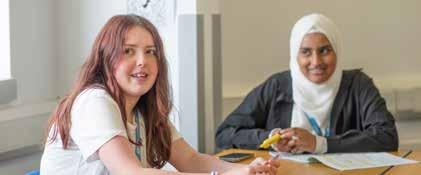
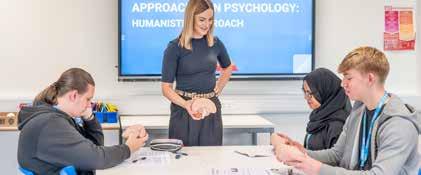
Recent students have gone on to study Religion and Education, Childhood Studies, Politics, Education Studies and Theology and Religious Studies.
You do not need a GCSE in RS or a religious faith, but must be willing to critically assess your own and others’ views. There are regular workshops to assist with your studies, help with exam preparation and advise you on university applications.
There are also opportunities to attend seminars on issues related to religion and ethics run by local universities at the College.
Pathway: A Level Exam board: AQA
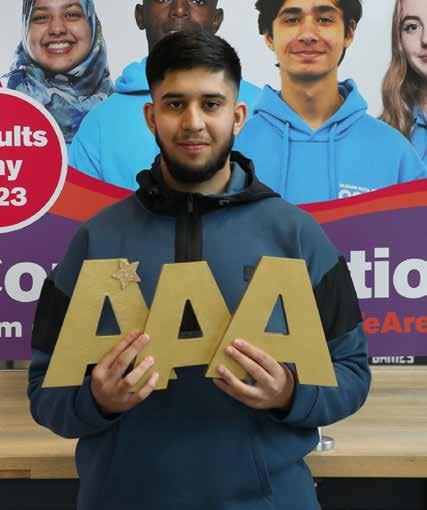
Assessment Year 1 and Year 2: 100% Exam
Sociology asks us to take a step back from the world we live in and to question how society works. Sociologists are particularly interested in power, inequality and social order, and look at the ways in which gender, ethnicity and social class can influence our lives.
If you have found yourself asking questions about the way society works, then Sociology may be what you have been looking for. You will develop your ability to evaluate the evidence, present logical arguments and deepen your understanding of the society in which we live.
WHERE WILL THIS LEAD?
Sociology is a good basis for any degree course and is highly regarded, particularly for careers in social work, teaching, the police and legal professions, research, journalism, welfare, management and human resources.
Sociology will also develop a range of valuable skills, including analytical, evaluative and communication skills, as well as greater self-awareness and understanding of others. These skills are prized by Russell Group universities.
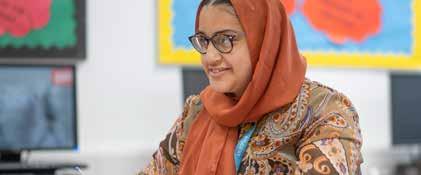
Sociology students have the opportunity to attend the Inter-Faith conference held at the college annually. This supports the Beliefs A Level topic area as well as allowing students to have the opportunity to listen to and interact with speakers from a range of faith groups. We also offer support workshops for students who we feel would benefit from this.
Mateeb Hussain
“OSFC allowed for many opportunities, giving an insight into possible future careers.”A*AA in Maths, Biology and Computer Science. Mateeb will go on to study Computer Science at Manchester Metropolitan University.
Pathway: Blended Exam board: OCR
Assessment Year 1 and Year 2: 2 units examined, 3 units coursework
The Sport course offers an opportunity for students to immerse themselves in the varied disciplines and roles possible within the industry. From learning about how the body systems respond to exercise, to investigating businesses within the sport and leisure sector.
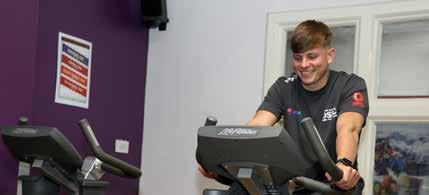
You will also develop your understanding of coaching and improve your practical skills in a variety of sports. This course will suit you if you have a passion for sport and enjoy looking into its many facets. You’ll also develop working links with the providers of sporting activities in the local community.
Students have recently gone on to study Exercise Physiology, Physical Education, Sport and Exercise, Sports Development, Sports Nutrition, Exercise Physiology and Sports Coaching. Sport can lead to a broad range of careers in leisure management, sport and recreation management, the emergency services and the armed forces. Sport will also teach you valuable communication and teamwork skills.
Strong links are formed with employers, leading to work experience, placements and talks. As a student on this course, you can be involved in leadership events as part of our primary school work.
You will also have the opportunity to take part in many trips. Groups visit the football museum, Sports City and various Centres of Excellence to name just a few of the options.
Pathway: Vocational Exam board: OCR
Assessment Year 1 and Year 2: Coursework and 2 externally assessed exams
Special entry requirements: You will need to be currently competing in either a team or individual sport, and continuing this during your time at college.
The Sport course offers an opportunity for students to immerse themselves in the varied disciplines and roles possible within the industry. If you have a passion for sport, you will be able to examine it from the perspective of many possible future careers. Prepare yourself to be a performance analyst, nutritionist, rehabilitation therapist, psychologist, even a personal trainer, outdoor and adventurous activities instructor, a sports business owner, or maybe delve into events management, coaching or even teaching PE. As a full time sports course you will cover units such as Talent Identification, Event Management, and Athlete’s Lifestyle.
This course opens all the doors to a future in Sport, Active Health, Coaching and Leisure Management opportunities. It makes great links with the worlds of business, science/health and and event management, providing a broad foundation for a wealth of employment opportunities and progression to higher education. Students have recently gone on to study Exercise Physiology, Physical Education, Sport and Exercise, Sports Development, Sports Nutrition, Exercise Physiology and Sports Coaching.
Sport can lead to a broad range of careers in leisure management, sport and recreation management, the emergency services and the armed forces. Sport will also teach you valuable communication and teamwork skills.
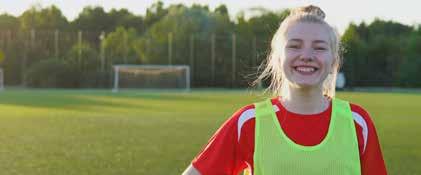
Special Features for the Sport Extended Diploma are the same as the Single Diploma, please see previous course for this information.
Pathway: A Level Exam board: Edexcel
Assessment Year 1 and Year 2: 100% Exam (3 papers)
Special entry requirements: Grade 5 in GCSE Maths.
WHAT WILL YOU LEARN?
If you are a numerate student and enjoy working with mathematical formulae which produce a useful result, then you should consider joining the A Level Statistics course.
Graphical calculators are used to work out answers relating to data and probability and it is also important to explain the meaning of what has been found. You’ll study a selection of probability distributions, the collection of data and various hypothesis tests.

You’ll find Statistics very useful if you wish to pursue university and career routes that require the ability to work with and interpret numerical and statistical data.
WHERE WILL THIS LEAD?
A lot of pupils that study A Level Statistics go on to study Math or Science based subjects at university.
SPECIAL FEATURES
You will constantly participate in group work and individual projects investigating data to develop a better understanding of how this is done in real businesses.
Pathway: A Level Exam board: OCR
Assessment Year 1 and Year 2: 100% Coursework
Special entry requirements: Grade 4 in an Art subject at GCSE is beneficial but not required. Drawing and design skills are desirable but will be developed on the course.
Have you always wanted to know how to make clothing or decorative products? Do you enjoy art, learning new techniques and being hands-on? Then this course is for you.
No prior making or designing experience is required, as all of the skills and techniques you will need to use will be introduced on the course, however the ability to draw is expected. You will work with a wide range of materials and processes and have the opportunity to explore both wearable design and decorative surfaces.
You will ultimately learn how to work through a process of research, design and making, which will result in original pieces of work.
WHERE WILL THIS LEAD?
Textiles is a useful course for HE courses and careers in all areas of art, design and crafts, such as fashion and textiles, fashion design, costume design, fashion buying, fashion marketing, fashion styling, embroidery operation, millinery and wallpaper design.
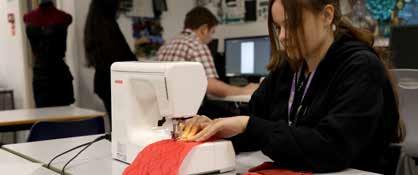
You will also develop a range of transferable and confidence building skills, including critical thinking and discussion and the ability to respond to a concept or idea with independence.
You’ll have the opportunity to go on a range of trips. For example, past students have visited galleries in London and Manchester.
Assessment Year 1 and Year 2: External Assessment 2 Units – Including 1 Examination
Do you love Travel? Did you know that you could make a career out of it in the dynamic, diverse and expanding travel & tourism industry? Memories of travel can last a lifetime and all travellers need the help of those who work in the travel and tourism industry to ensure their trips run smoothly.
If you enjoy learning through practical, work-related activities and completing assignments based on realistic workplace situations, then the BTEC Travel and Tourism course is for you. You will study Global Destinations, Marketing, as well as Travel specific units like Visitor Attractions and the World of Travel and Tourism. You will be taught transferable skills, in a fun, enthusiastic and engaging style. With this course, a world of opportunities really does open up to you.
Our subjects can lead to a wide range of Tourism, Hospitality, Events and Management-related HE courses and careers, or you can find employment in the industry, with a variety of UK and worldwide employers.
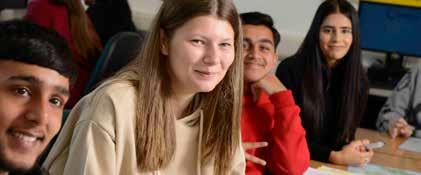
Travel and Tourism also teaches you a range of transferable skills, including teamwork, research and organisation skills.
You will have the opportunity to take part in a residential trip to Paris or Barcelona. We also run fantastic trips and visits to Alton Towers, Blackpool Pleasure Beach, Knowsley Safari Park and the city centre of Manchester.
You will take part in role plays for practical aspects of the course.
–––
A*BB in his A Levels in Sociology, Physical Education and Psychology. Lucas is now heading to Huddersfield University to study Physiotherapy.
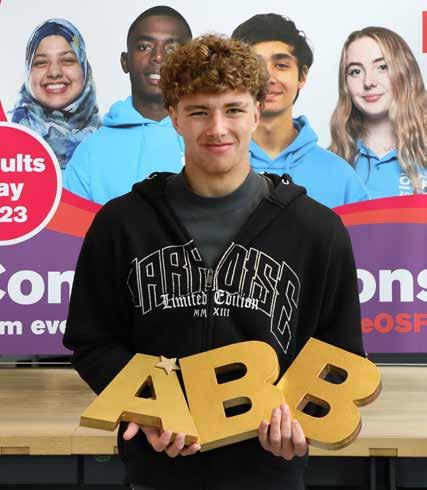
“Provides many opportunities when leaving college with not one lesson leaving you bored.”
Lucas Wilkes
Please enter OL8 1EU as the college postcode will send you to an incorrect location, and then select Connaught Street this will bring you to the entrance of the college car park.
The college is unable to accommodate visitors with a parking space. There are a number of public car parks within the local area that are within east each of the college.
For full details on bus, train and metro routes from your home or school to Oldham Sixth Form College, please visit the official Travel Line North West website: www.traveline.info
Our main building is home to a wide variety of our subjects, spread over four floors. The building boasts a recently refurbished cutting edge art department and photography studio, our unique Large Lecture Theatre, a modern drama studio and music practice rooms. There are also numerous study areas, computer suites, as well as the Additional Support Hub and our careers advice team.
If you are considering studying a science subject, then our science centre really does have the best facilities in the area. With state of the art labs and equipment not even available to all universities, we will help you advance your knowledge and expertise in this highly competitive field. Spread over five floors, with over 20 labs and fantastic views, we can’t think of a better place to study science. Make sure you visit the science centre on one of our Open Days and see the amazing facilities for yourself.
The modern DLB is home to Psychology, Health and Social Care, Mathematics, Computing and IT. You will also find The Know, our Learning Resource Centre, which has a fully stocked library, computer suites, mobile charging stations, quiet study areas and a literacy hub. We even have our very own Costa Coffee!
The sports centre offers a fully equipped modern gym, a spacious dance studio, large sports hall and the new climbing wall. The facilities are available to everyone, whether you’re studying sport, taking part in one of our active Xtras, or just wanting to keep yourself in shape. Our sports staff are always happy to offer an insight into the sports teams and clubs available to join at OSFC.
1. The Sixth Form College Main Building
2. Duncan Lawton Building
3. The Sixth Form College’s Sports Centre
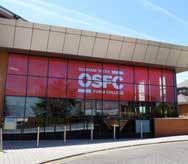
4. The Sixth Form College’s Science Centre
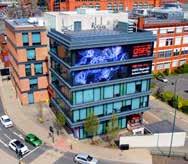
5. Oldham Leisure Centre
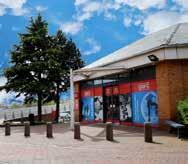
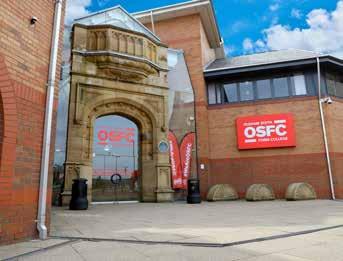
6. Dental Practice
7. Takeaways and Shops
8. Sainsburys
9. Positive Steps
10. Lyceum Theatre
11. Gallery Oldham
12. Oldham Library
13. Nandos
14. Cinema
15. McDonalds
16. Spindles Shopping Centre
17. Mahdlo Youth Centre
“Adopting professional practice from the Leeds Rhinos Academy set up, this partnership will provide a pivotal pathway that retains players in the game and allows students to learn from this great club & its coaches, whilst in no way hindering their academic ambition”



OSFC have partnered with Phoenix Dance Theatre to develop a new Youth Academy in Oldham. The academy is open to young dancers in the area aged 13 – 18 who are interested in pursuing a career in dance.

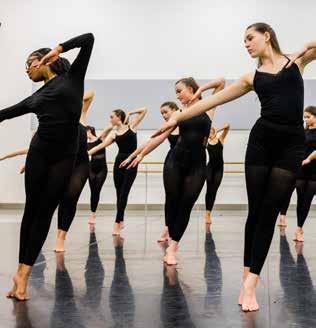
As an OSFC student on the programme, learners will combine their academic studies at the college, access exclusive workshops & talks with industry professionals and receive high quality pre-vocational dance training. This exciting opportunity is perfect for those with a desire to progress onto some of the top conservatoires and higher education establishments for Dance worldwide. Students enrolling into the college will be able to undertake the college’s full range of A Level or Vocational programmes whilst developing excellent dance technique alongside. In practice this might mean that students select 4 subjects of their choice, or the Live & Recorded Arts specialist pathway. The details of all courses offered can be found through our website.
Youth academy students will access a 90-minute lesson each week to develop excellent contemporary technique and throughout the year, will work with current and former Phoenix Dance Theatre dancers and internationally acclaimed choreographers. Dance pieces are created during intensive courses that take place during school holidays which are then performed at the college’s annual dance showcase and at various dance platforms across the UK, including the Stanley & Audrey Burton Theatre in Leeds.
Phoenix Youth Academy was founded in Leeds in 2009. Since then, many PYA graduates have gone on to successfully audition for numerous leading conservatoires including: Rambert School of Ballet and Contemporary Dance, Northern School of Contemporary Dance, London Contemporary Dance School, Trinity Laban Conservatoire of Music and Dance, The Ailey School, Institute of the Arts Barcelona, Royal Conservatoire Antwerp, Bird College, Laine Theatre Arts and Urdang Academy. Two Phoenix Youth Academy graduates have succeeded in being category finalists in the BBC Young Dancer competition.
For further information please contact:
Corisse Ledward
(Course Leader for Dance at OSFC): cld@osfc.ac.uk
Antonio Borriello
(Professional Training Manager at Phoenix Dance Theatre): antonio.borriello@phoenixdancetheatre.co.uk
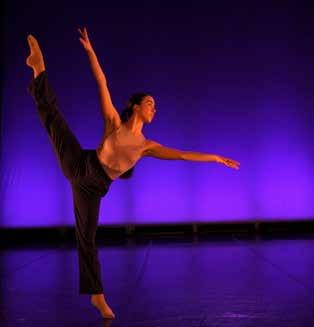
The Varsity Academy is an exciting new initiative led by Oldham Sixth Form College (OSFC) in conjunction with all 10 of its Oldham partner schools. It is an outreach programme that will see 200 of the most able Year 10 students in Oldham engage in ‘stretch and challenge’ activities for a year in preparation for their future studies at sixth form and at university. The 200 students have been selected by the schools, with 20 from each institution.
Academic research suggests that it is never too early for students to work at developing higher level knowledge and skills, or to begin thinking about their future progression routes. The Varsity Academy is OSFC’s way of contributing to this process in collaboration with students, schools, parents and carers.

The 10 schools, academies and colleges have been subdivided into 2 cohorts for the purposes of the delivery of the sessions:
Cohort B
The Varsity Academy programme will be overseen by Dr Richard Lee, Assistant Principal at OSFC, who manages progression at the college, with a specialism of working with its most able students. He will be supported by 4 highly-experienced colleagues:
• Maria Beswick: Curriculum Area Leader for English, Languages, Media & Film

• Tom Butler: Course Leader for A Level Maths and Further Maths


• Nicola Canham: Course Leader for AS Level Biology
• Jack Evans: Curriculum Area Leader for Humanities
The Varsity Academy is also delighted to have forged a link with the prestigious OxNet project, established by Pembroke College (Oxford University) and will be receiving extra support from Oxford academics during the course of the programme.
Over the course of the Varsity Academy programme, the students will visit OSFC once per term, with 4 visits spread throughout the academic year. Each visit, the students will have 4 sessions - in Science, Maths, English, and Humanities.
During the year, the students will also engage in online lectures, seminars and competitions. Some of the lectures and seminars will be subject-based, while others will be thematic, looking, for example, at Russell Group universities or specific routes into Medicine or Law.
Cohort A
Co-op Academy Failsworth
Blessed John Henry Newman
RC College
Oasis Academy Oldham
The Oldham Academy North
Waterhead Academy
Cohort B
The Hathershaw College
The Hathershaw College
Oasis Academy Leesbrook
Oasis Academy Leesbrook
The Radclyffe School
The Radclyffe School
Royton & Crompton E-Act Academy
Saddleworth School
Royton & Crompton
E-Act Academy
Saddleworth School
Within the 4 subject areas, the students will be taught about aspects of Science, Maths, English, and Humanities that they will not cover during their GCSE studies. They will be introduced to new topics, new ideas and concepts, and new ways of approaching subjects and problems.
The intention of the Varsity Academy is to enhance the students’ subject knowledge and to develop in them additional skills that will allow them to excel at school, college and university. They will also have the opportunity to collaborate with their peers from across Oldham, and to learn from each other and the highly experienced teachers with whom they will be studying. In addition, at the end of the programme, there will be a graduation ceremony, at which the efforts of the 200 students will be celebrated in the company of their parents and carers.
Attend
Interviews will be held between January and March. The interview is a supportive process, aimed at helping you make the right decisions. Before we invite you for an interview we’ll look at your predicted grades and mock results, as well as your attendance and commitment at school. You will be sent an email with details of your interview
You will be invited to our New Students’ Day on Monday 10 July
Pre-enrolment
Over the summer, you will be emailed with details about how to complete your pre-enrolment for OSFC Enrol
To complete your enrolment, you will need to attend an enrolment appointment in late August, after you have received your GCSE results.
Enquiries about applications can be made to admissions@osfc.ac.uk
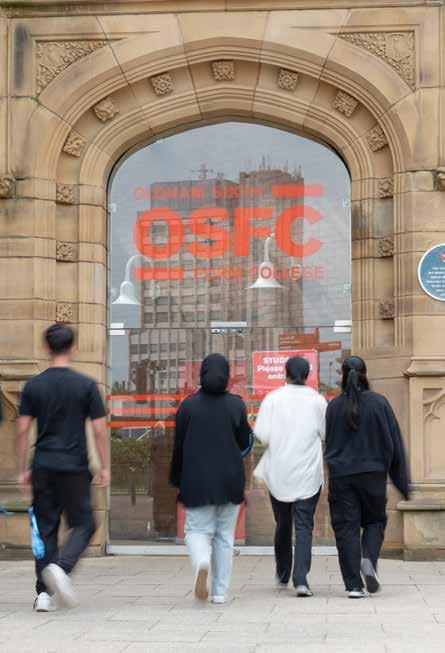
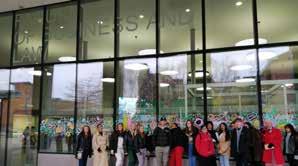
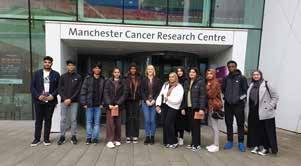
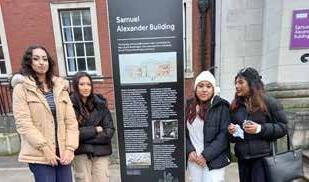
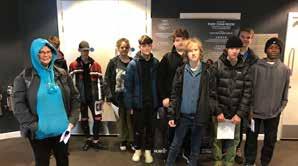
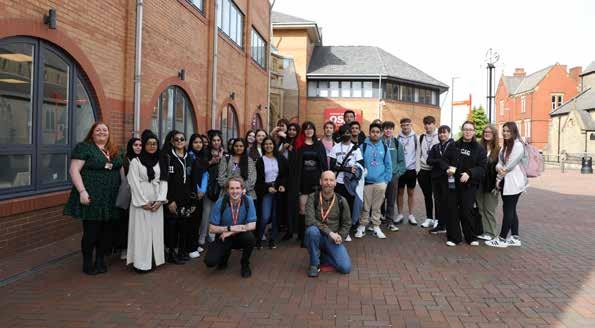
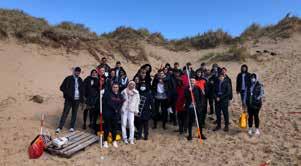

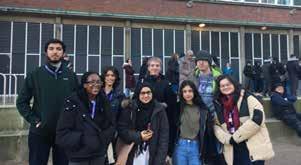
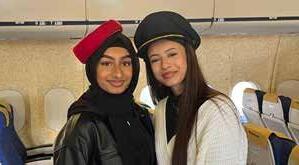
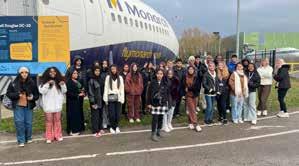
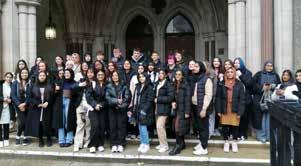
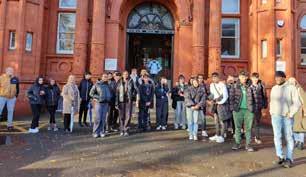
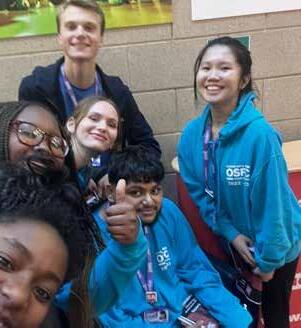
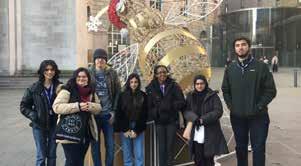
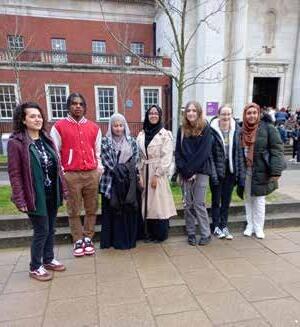
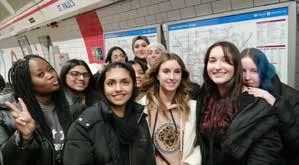
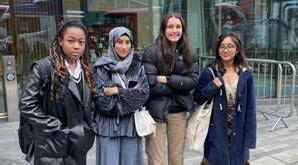
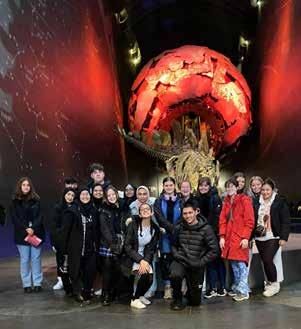
Executive Principal


Jayne Clarke
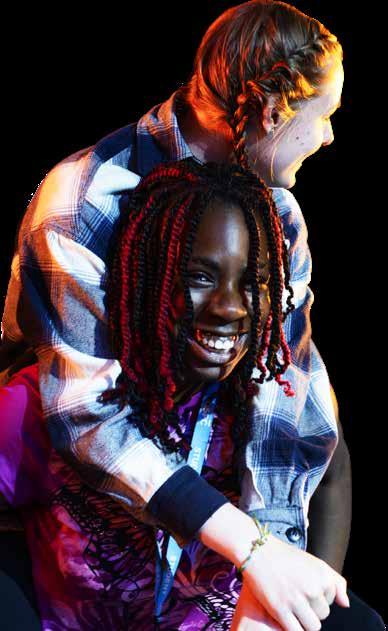
Associate
This prospectus is fully recyclable and made from sustainable materials Proud
